Diary
Switzerland
June 20 – 24, 2017Transatlantic flights are booked. The research trip to Latin America will start on July 3rd and will end on November 4th 2017 in Frankfurt am Main.
Compliance-Roundtable in Luzern. Midsummer temperatures of more than 30°C are a good preparation for the upcoming months in Latin America.
The contact persons from Latin America contacted in the first wave responded for the most part - the Germans somewhat more frequently than the Swiss. I am very confident that exciting interviews will be possible.
Informative preliminary talk with Oliver Knoerich from the German Embassy Mexico City. He emphasizes the great importance of corporate responsibility for the future social and economic development of Latin America.
Practical preparations are in full swing. Important travel essentials provided: sun cream, toiletries, shoes, etc. Latin America - we are coming :-)
Mexico
July 3 – 25, 2017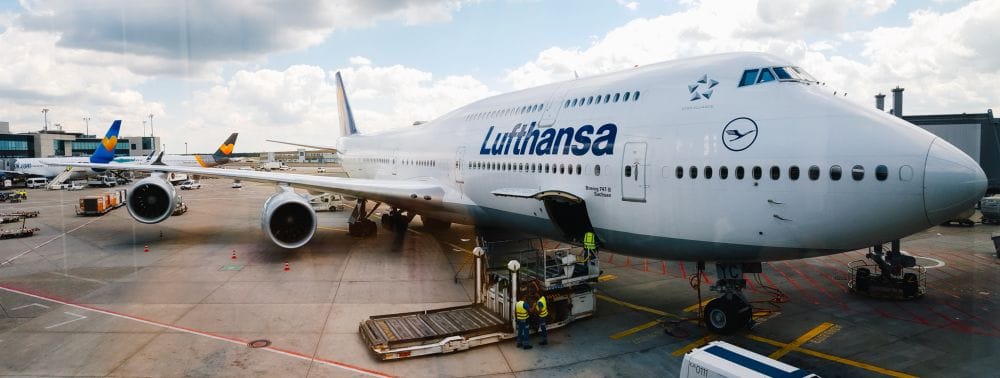
Flight LH498 brought us with delay, but safely, from Frankfurt am Main to Mexico City. It is cooler than expected in Mexico: The rainy season begins.
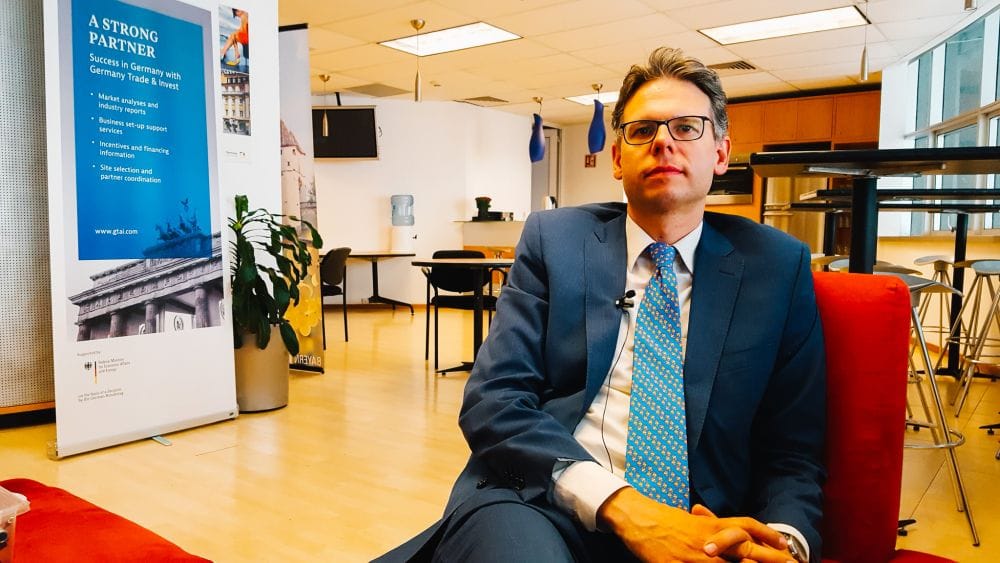
The first interview of the trip takes place with Andreas Müller from the AHK Mexico City. He emphasizes that German companies are committed to dual vocational training (based on the German model), in some cases well beyond what is necessary. Some companies provide training beyond their own needs and thus support the establishment of a dual training system in Mexico.
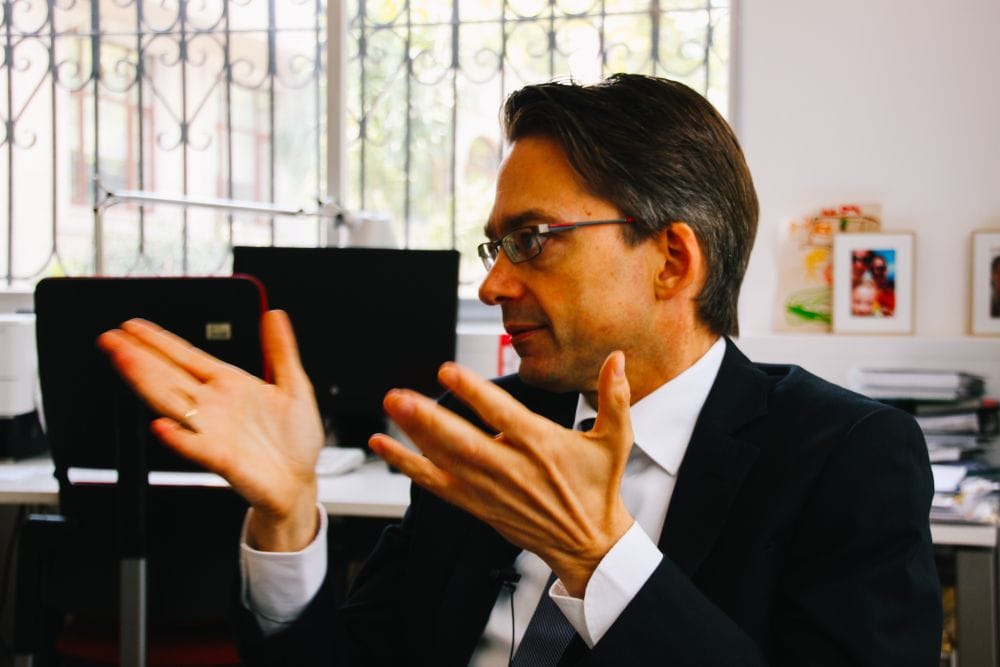
Oliver Knoerich from the German Embassy Mexico reports that some German companies prefer not to participate in government tenders, but to concentrate on doing business with the private sector.
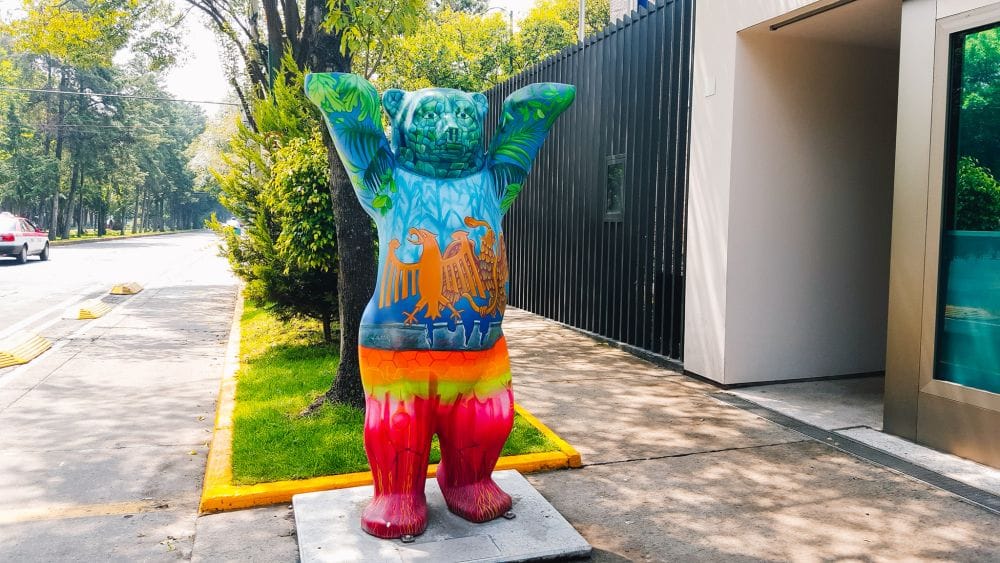
Berlin Bear in front of the German Embassy in Mexico City
In the noble residential areas like La Condesa or Polanco, there is permanently running water. In other areas of Greater Mexico City, tap water is regularly rationed or delivered by truck (Camion Pipa).
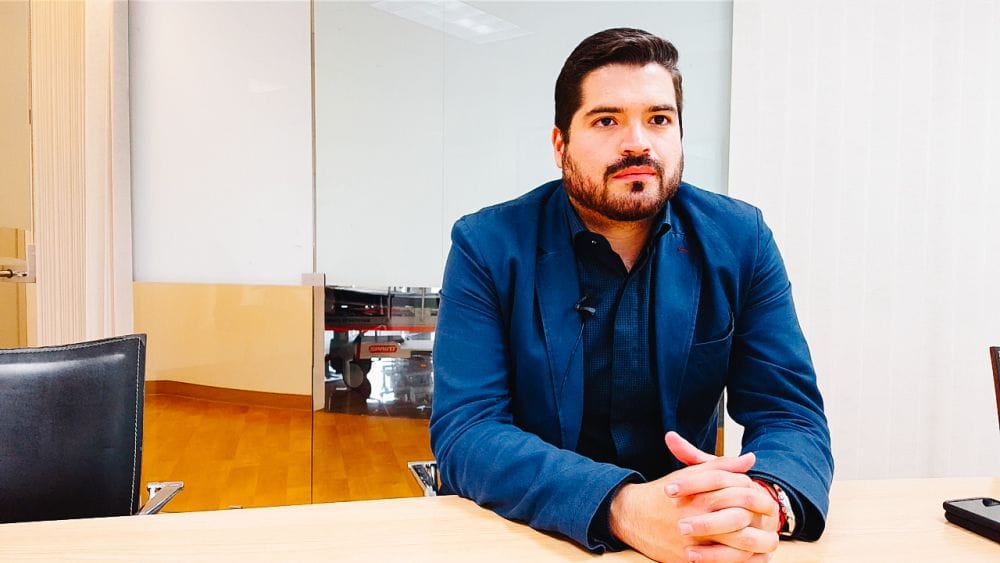
According to Augusto Martínez of Draeger Mexico, the definition of corruption is the same all over the world, without cultural differences. Accordingly, corruption means circumventing the rules in some way in order to gain an advantage. “Corrupción es brincar la ley mediante algún medio a ventajarse”.
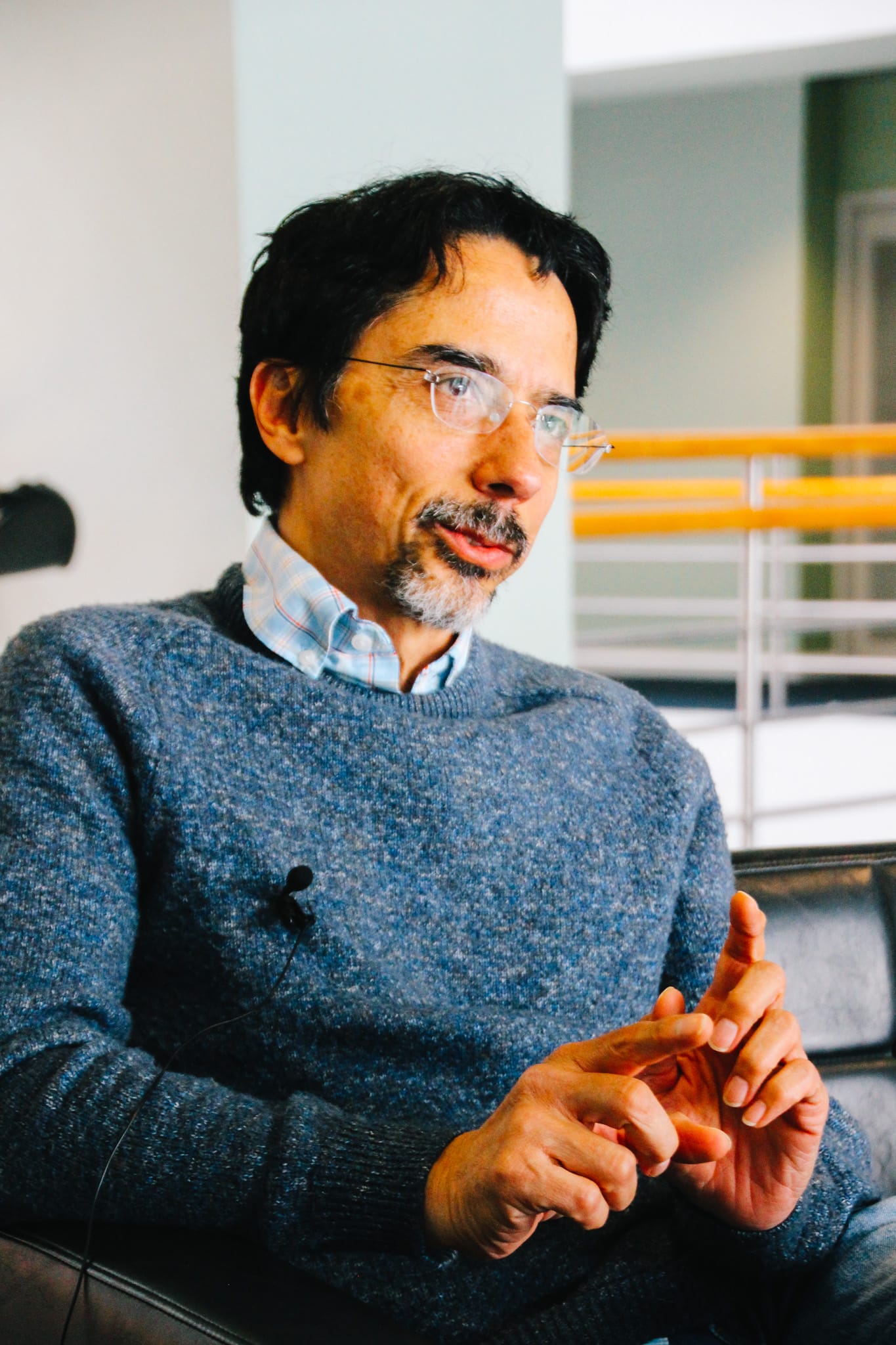
Alberto Equihua, local coordinator of the BDI’s innovation partnership cooperation project in Mexico, notes that there is unfortunately a general belief in the country that social responsibility is a luxury that few companies can afford. And these are usually larger companies.

The Mexicans love it sweet... ;-)
Today we get an insight into a “different Mexico”: The weekly market in the Municipio Coacalco de Berriozábal in the state of México is probably rarely visited by foreigners. On the way back, we experienced how fast the streets flood with rain and become small rivers.
In the periphery of Mexico City, municipal waste disposal does not function properly. Private garbage collectors fill this gap.
Stefan Jost, head of the KAS foreign office in Mexico, reports that there is great patriotism in Mexico, but at the same time there is little trust in the government. The attitude “the less I am dependent on the official structures, the better off I am”, strengthens the informal sector.
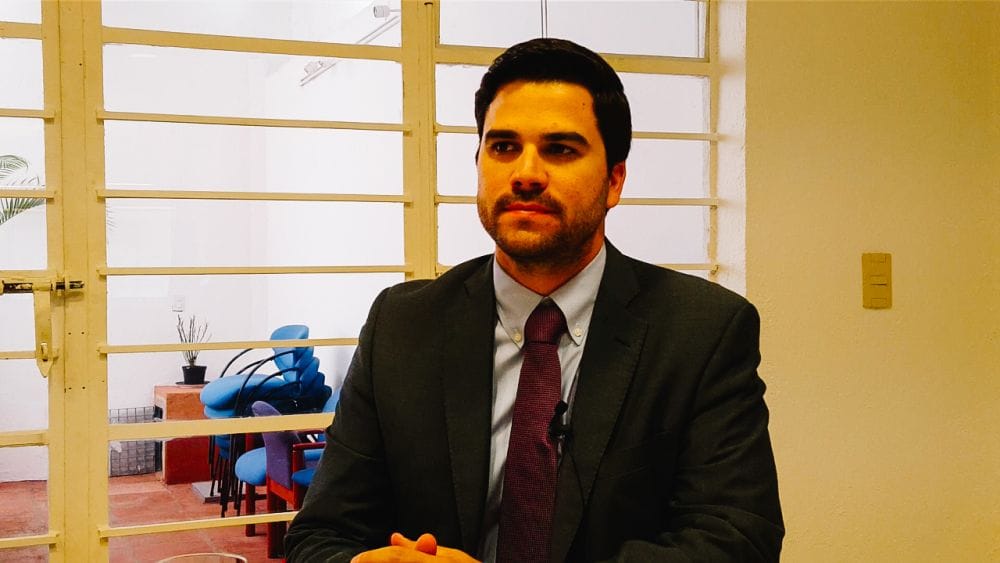
Jorge Aguirre, a young entrepreneur from the state of Sonora, stresses that corruption, like stairs, must be swept from top to bottom, otherwise it won’t work.
The smart TV in the accommodation does not receive a normal, linear television program. Only YouTube and Netflix are available via the Internet.
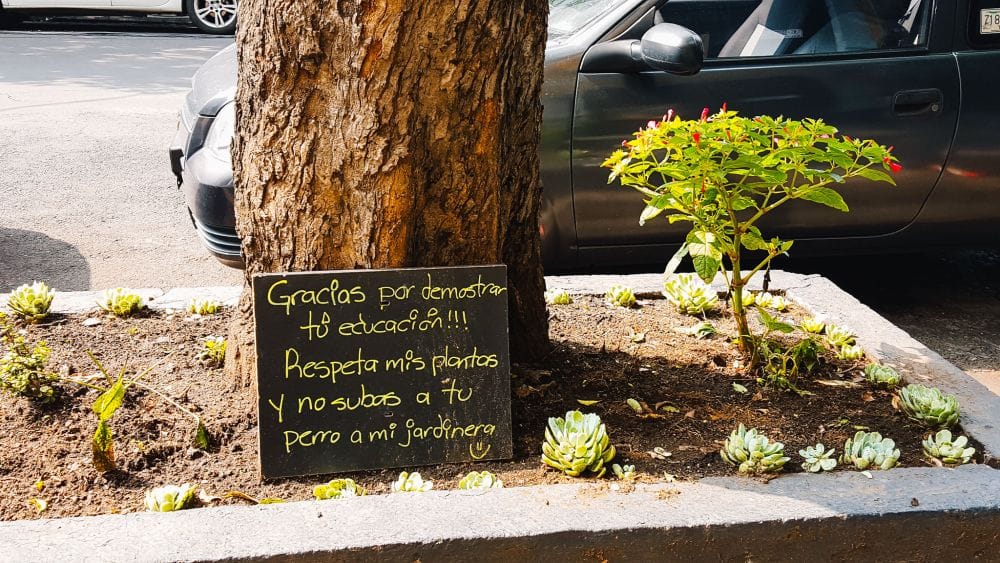
Urban Gardening trials in Mexico City must defend themselves against dog excrements.
City traffic on the Avenida Arcos de Belén
The event “Bonos de Impacto en México: oportunidades y retos” discusses an innovative financing mechanism for social programmes. Social projects are pre-financed through social impact bonds from private, impact-oriented investors. Only if the projectachieves its agreed effect will the investors be reimbursed by the public client. A major hurdle for the approach is the lack of confidence that the Mexican state will actually fulfil the commitments it has entered into in case the project succeeds.

The Aztec heritage is uncovered in the centre of Mexico City. When the Spaniards reached the then Aztec capital Tenochtitlan in 1519, it was spread over several islands in Lake Texcoco. Today the lake has largely dried up. However, the sloping walls of many colonial buildings suggest the soft ground on which they were erected.
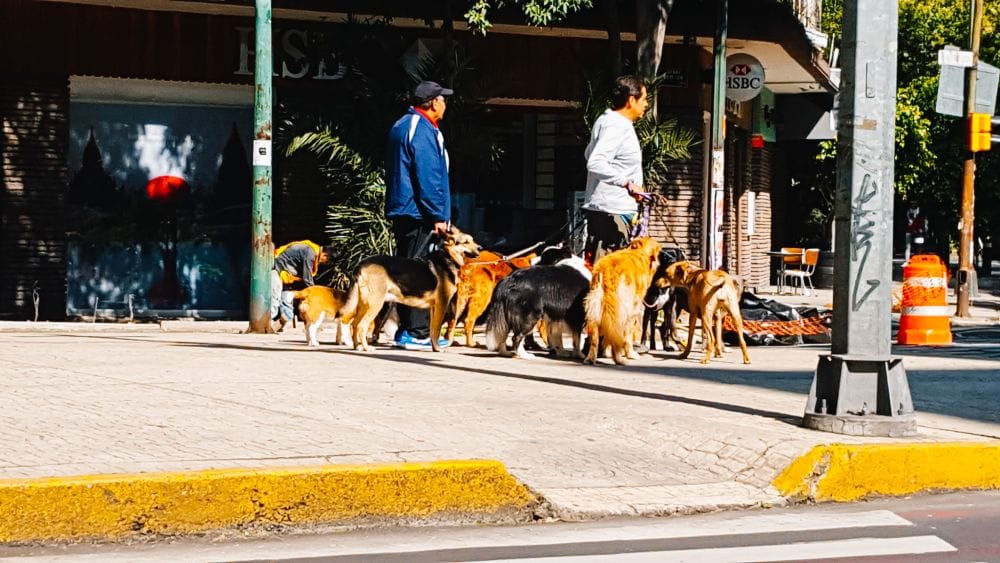
Walk the dog - Dog sitters are widespread in Mexico City. The Parque México is a popular walking area with a beautiful dog playground.
Mexican-style garbage separation.
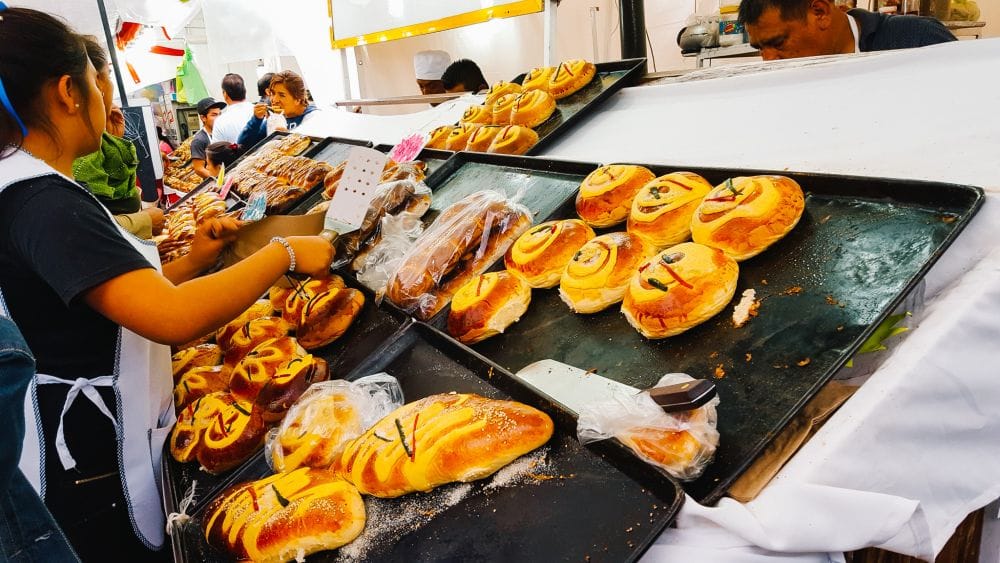
Best sweet pastry ever from the street market in San Angel :-)
A shamanic healer offers his services at the edge of a street market in the San Angel district. These are in great demand.
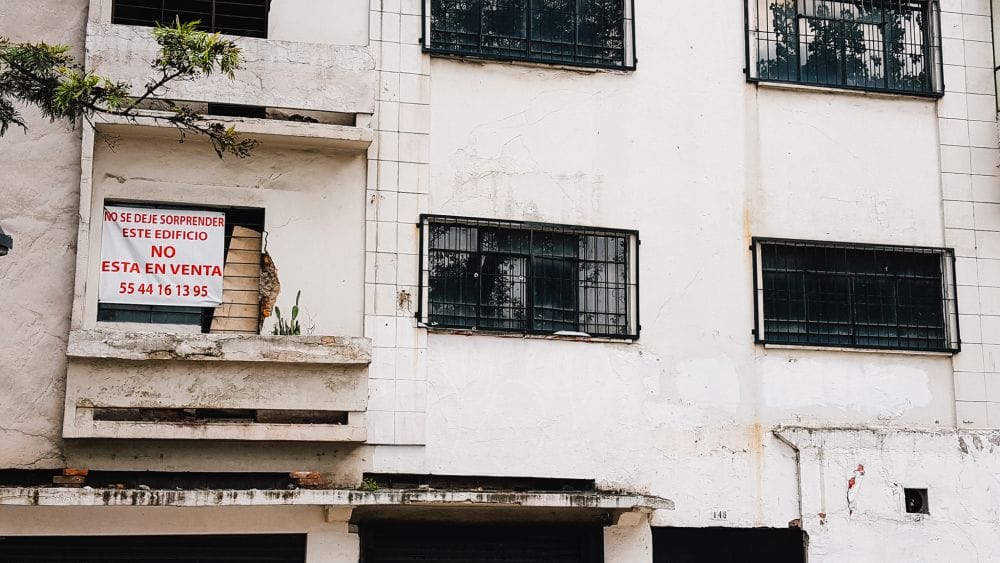
Not-for-sale: Residents fight against the gentrification of their neighbourhood, which they believe is also driven by corruption.
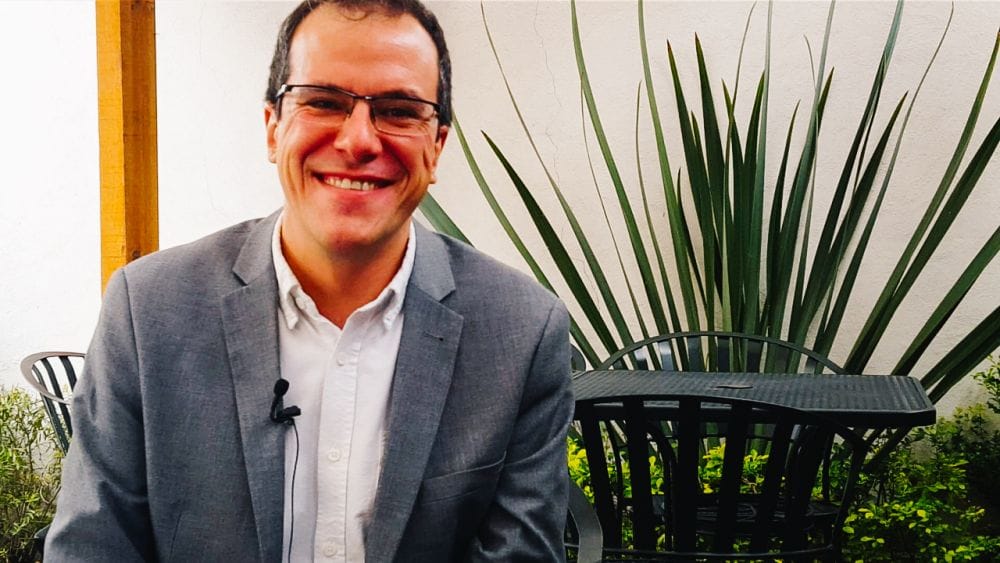
Javier Mestre, of Corresponsables, emphasizes “What is not measured cannot be improved”. Therefore, sustainability must be measured in companies. In addition, he emphasizes that there should be no copyright on corporate social responsibility. Nevertheless, some companies do not communicate their commitment so that they cannot be copied. He thinks this approach is wrong.
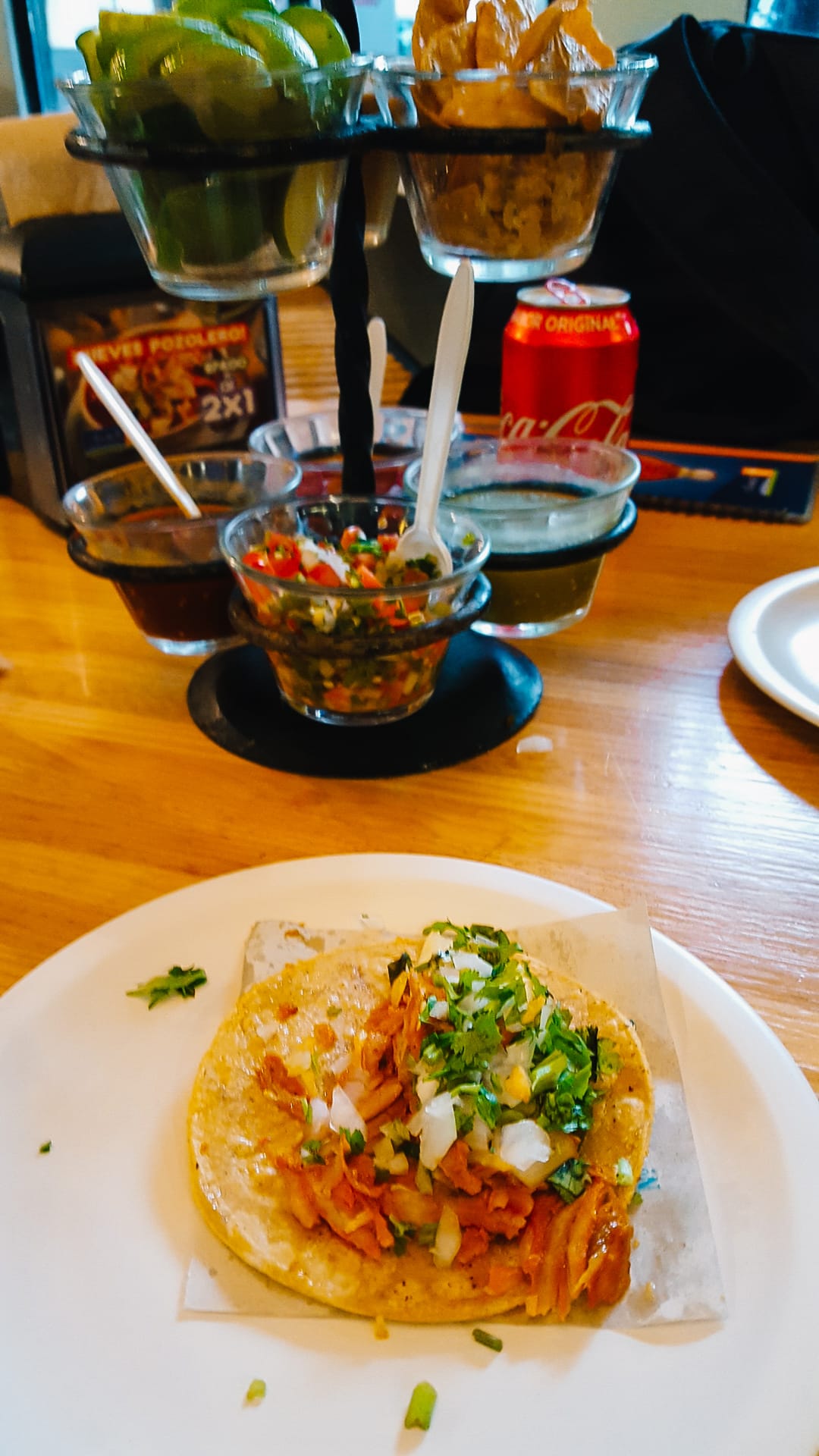
The taco al pastor is a very popular type of pork taco in Mexico. Who invented it? The proprietors of the restaurant El Tizoncito claim that it was them.
Lorena Cortes of CEMEFI points out that in Mexico, it is well regarded to spend as much time as possible at work. It is therefore one of the countries where most hours are worked, but at the same time productivity is among the lowest. There is a saying for this: “Hacer horas nalgas”, doing hours in which you do nothing.
In Mexico, being rich is often equated with being a villain. People think that you must have done something wrong to become rich. To be poor means not to want to study or work, hence to be lazy.
In Mexico, inequality is a bigger problem than poverty. Above all, the inequality before the law and with regard to access to justice is striking: “El que no tiene dinero no tiene a quien le defienda” (“He who has no money has no one to defend him”).
A woman collecting bulky waste drives through the streets and draws attention to herself with the help of a megaphone.
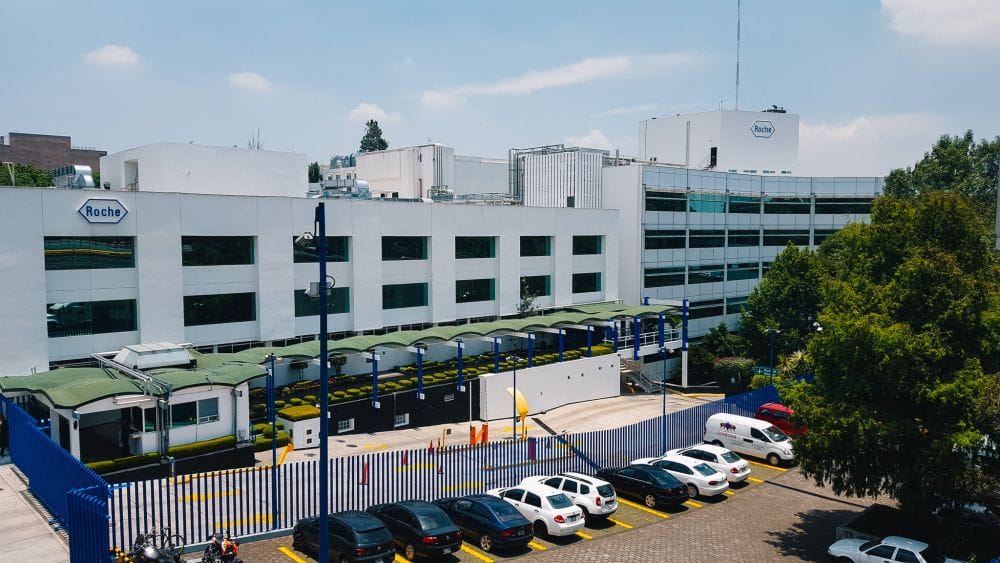
Talk at Roche. The Head of Procurement Mexico Arturo Alonso describes how the Swiss pharmaceutical company ensures sustainability in its supply chain. In his experience, local suppliers can learn a lot from multinational companies. At the same time, local suppliers are important to multinationals. The targeted exchange with suppliers on the subject of sustainability is also used as a driving force for innovation.
Netflix night: In the satirical film comedy “La dictadura perfecta” an influential television station helps a notoriously corrupt governor to improve his image and become Mexican president in exchange for a high bribe. After all we’ve learned about Mexico’s political system, this is unfortunately not an absurd plot.
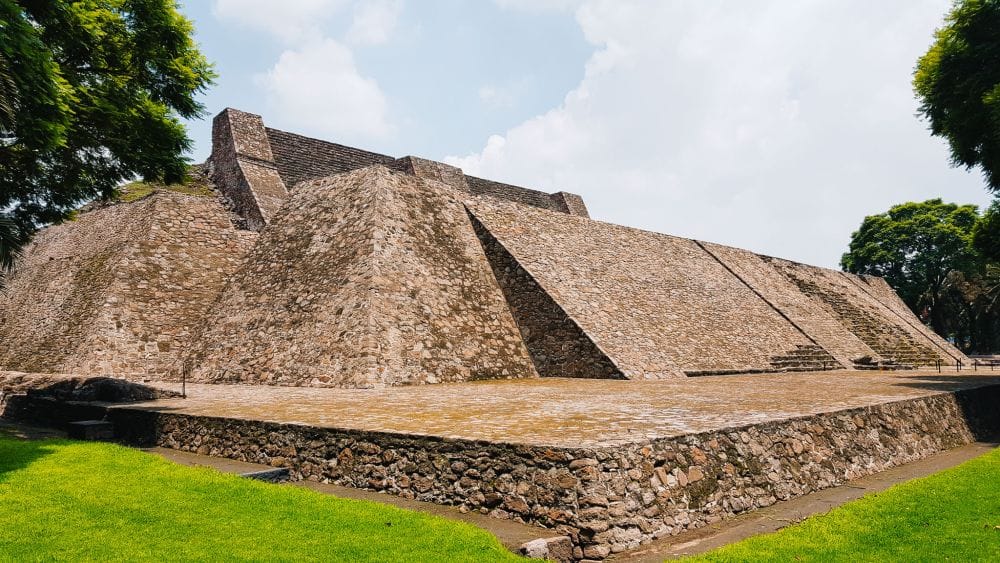
The entrance fee to the Pyramid of Tenayuca is usually 50 MXN per person. At the moment it is free as the ticket office does not have tickets due to a delivery bottleneck.
After 16 days and 450 km walk, about 50’000 pilgrims from the city of Querétaro arrived today in the Basilica Santa María de Guadalupe.
We’re expecting an important express shipment with TNT. This is going to be a disaster. After an odyssey through Europe, the shipment is already ten days overdue and there is little hope that it will arrive on time before our onward journey.
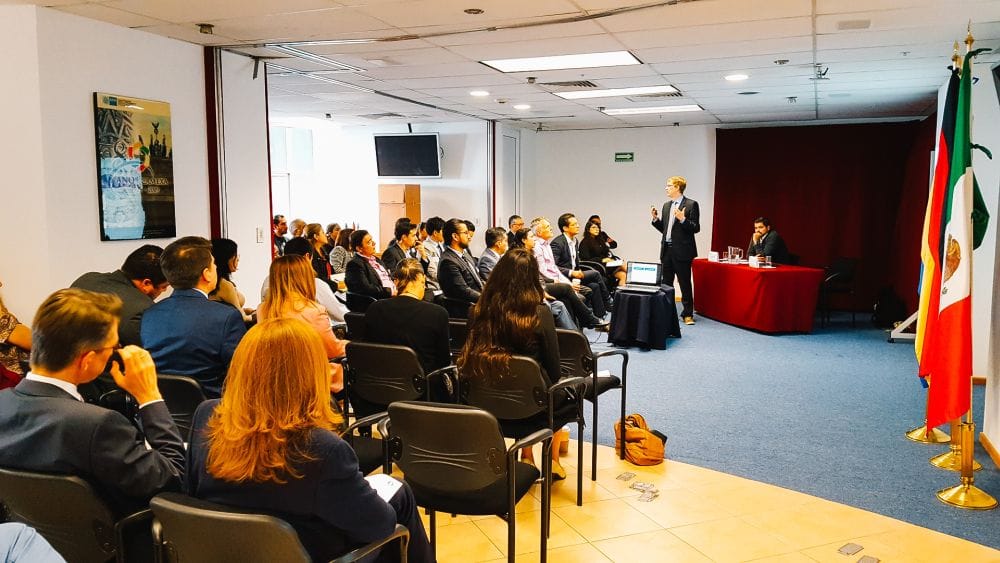
The first lecture of the expedition takes place at the AHK Mexico. About 60 people take part in the event on the topic of corruption prevention. This underlines the interest of companies in the topic. The event also serves as a kick-off event for a new AHK working group on compliance. Many thanks to Gabriel Carranza and his team!
During his work in Mexico, a small German entrepreneur learned the following: It is more important to know someone who knows who you have to go to in order to achieve things than to have someone in the company who knows the laws.
After 23 days in Mexico City, today we will continue overnight on flight AV2653 to Lima. Departure is at 23:50 o’clock.
Peru
July 26 – August 12, 2017First day in Lima: District Miraflores - the Polanco of Peru. Our apartment on the 10th floor offers a great view up to the Pacific Ocean. Here, Lima makes a very neat and clean impression. The streets are in better condition than in Mexico. Everything seems a bit like a film set, a bit unreal.
The first interviewee, Eduardo Benavides, stresses that there are two Peruvians: Lima and the rest of the country. For the indigenous population in the countryside, the Peruvians from Lima and other cities are also “foreigners”.
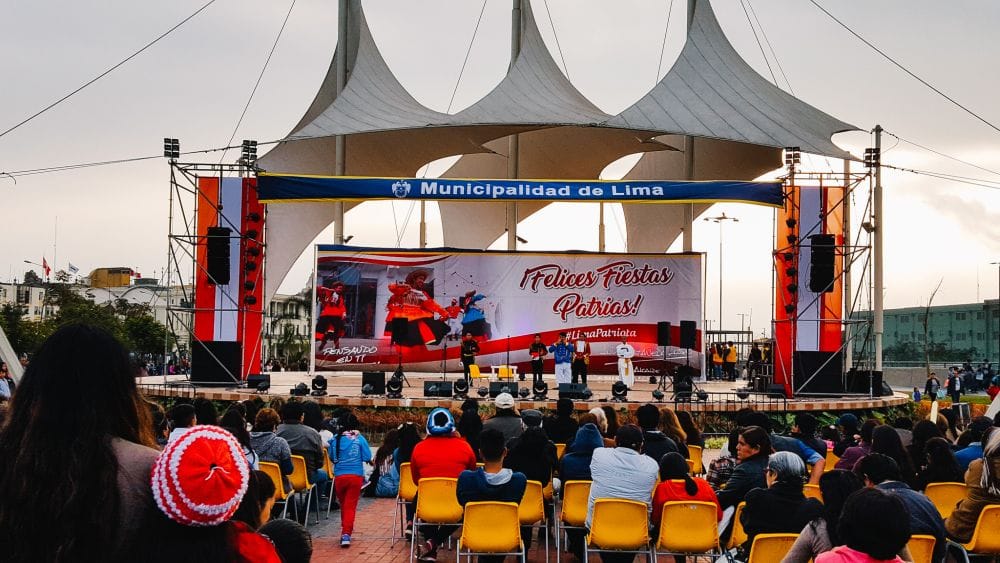
Today is the first day of the four-day celebrations of Peru’s national holiday, Fiestas Patrias, which commemorate the country’s independence from Spain in 1821. Therefore, no interviews will take place today and tomorrow.
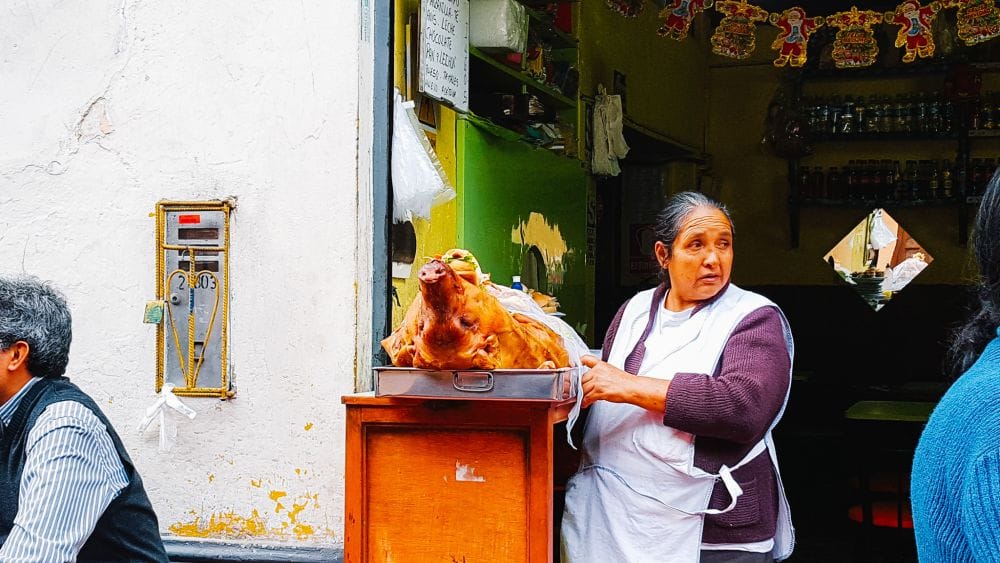
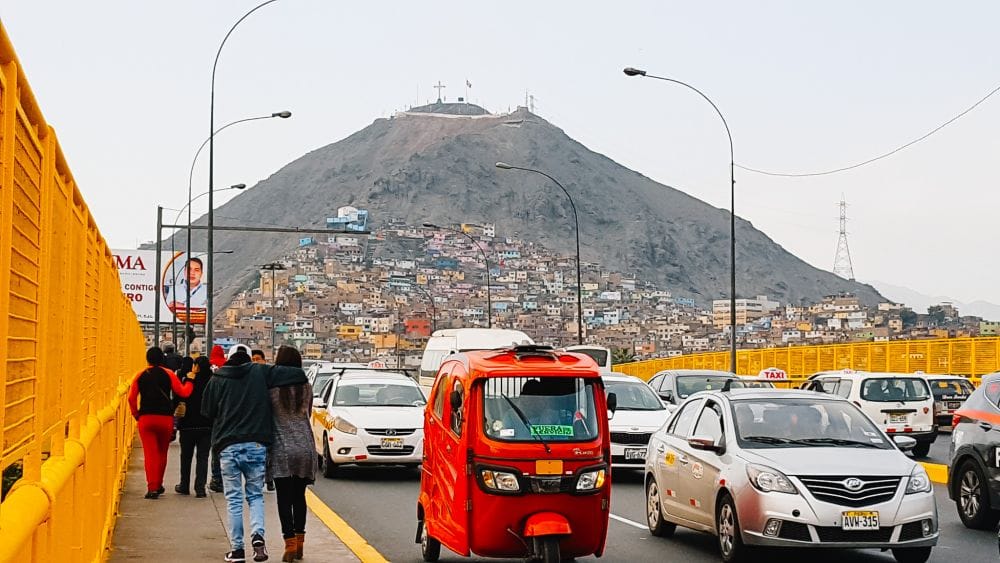
Today we saw the “real Lima”. We were in the old town - like many others. Due to the Fiestas Patrias the streets were partly overcrowded, but most shops were closed.
The Peruvians celebrate the Fiestas Patrias with a big military parade. This year, however, the parade lasts only two hours instead of the usual four.
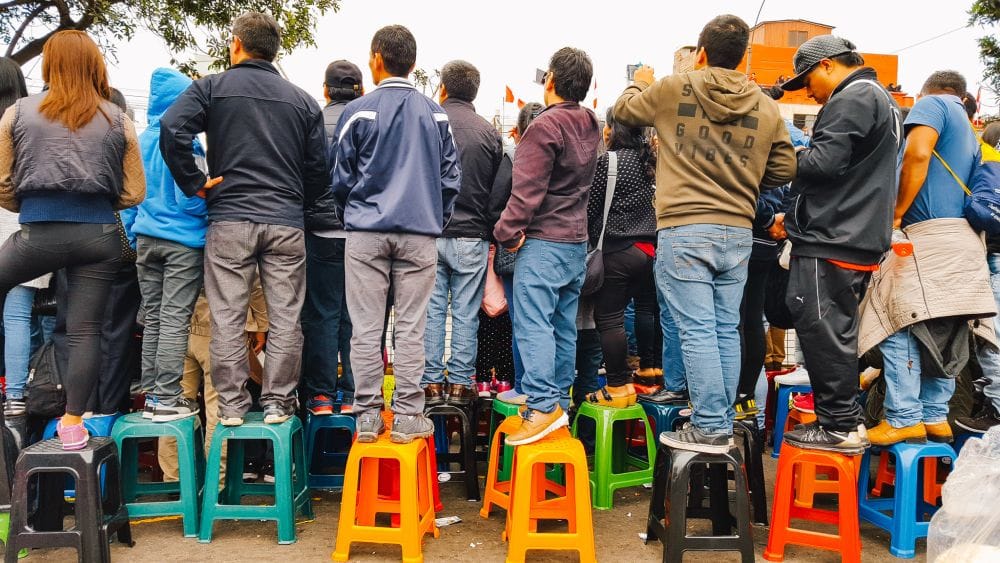
Everyone wants to see the big parade.
But the really interesting thing is not the parade itself, but the hustle and bustle around it. Hundreds of street vendors offer their goods for sale and you can experience the mechanisms of the market economy in its purest form: before the start of the parade, a stool costs 5 PEN and during the parade the price rises up to 7.5 PEN. After the end of the parade the prices immediately fall again.
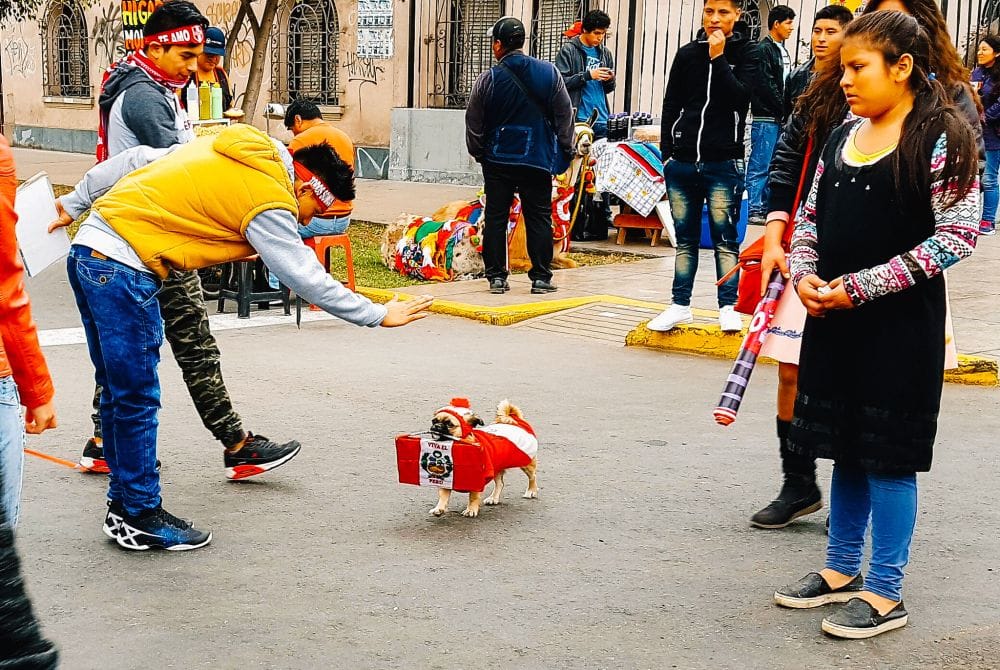
The patriotic pug must not be missing.
View of the steep coast at the Pacific Ocean.
On Sunday evenings they meet in Miraflores at the Plaza Kennedy for a dance.
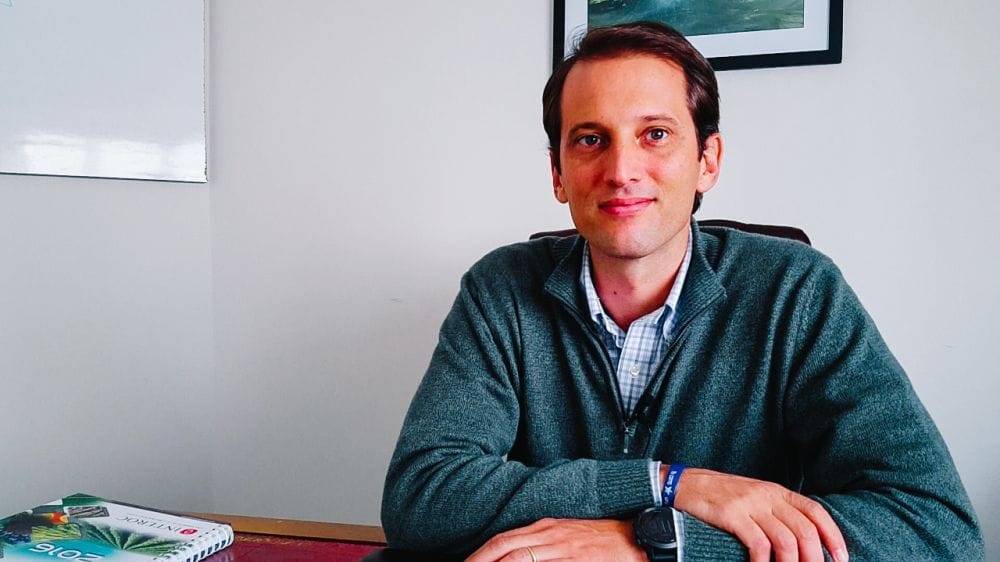
When meeting Felipe Custer, the entrepreneur stresses that informality exists out of necessity and not out of pleasure. Due to the high degree of informality in the Peruvian economy, one must always ask oneself where the individual products come from and control their origin.
Sebastian Grundberger, head of the KAS foreign office in Peru, observes that confidence in the state is very low in Peru. Many young Peruvians who are very well educated and have studied abroad come back with good ideas. As a rule, however, they do not want to run for public office. The reputation of the deputies is very bad and election campaigns are expensive.
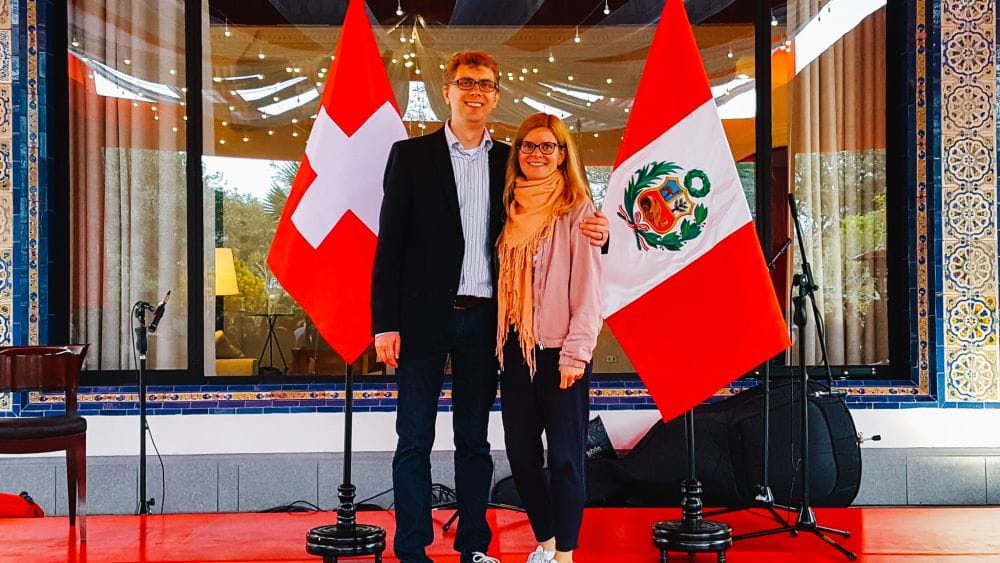
On the occasion of the Swiss national holiday, a reception is held in the residence of the Swiss ambassador. Peruvian President Pedro Pablo Kuczynski also gives a brief address. His family has Swiss-German roots. The President emphasizes the exemplary character that Switzerland has for Peru in his opinion
Sandro Sanchez, professor at CENTRUM Católica Business School, points out that in Peru, the opinion is widespread that all public officials are corrupt. Therefore, it is primarily a question of whether a politician leaves buildings behind. There is a saying for this: “roba pero hace obras”.
Very typical for Lima: when you walk through the streets, you are constantly being hit by taxi drivers who want to attract potential customers. You have to get used to that.
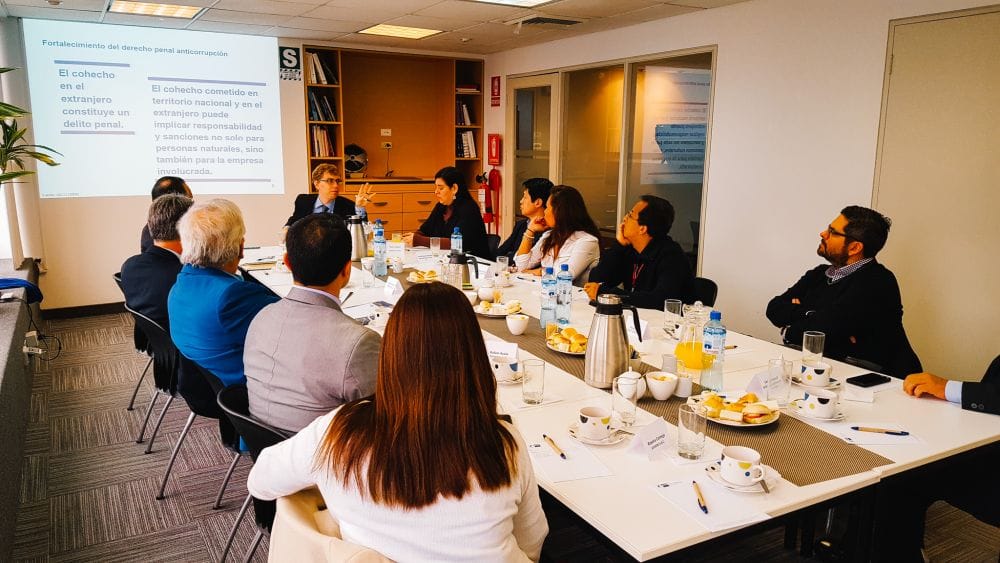
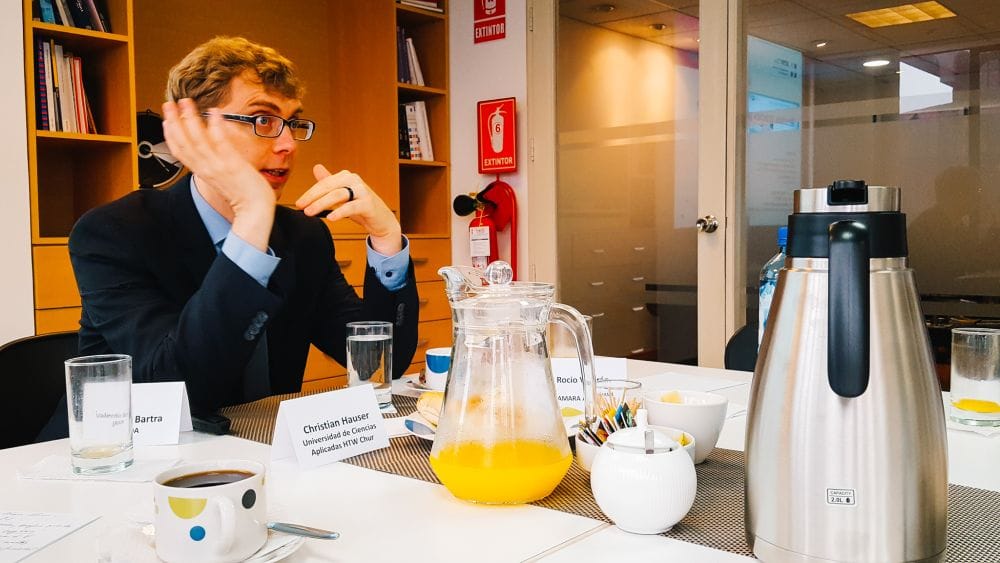
Christian Hauser at the lecture in the AHK Peru.
Today the AHK Peru organizes a working breakfast on the topic: “Ética y negocios: enfoques y experiencias europeas frente a la corrupción”. It becomes clear that so far there are hardly any platforms on which compliance officers can exchange information, but that there is a clear need for this. Many thanks to Rocío Villaran and her team!
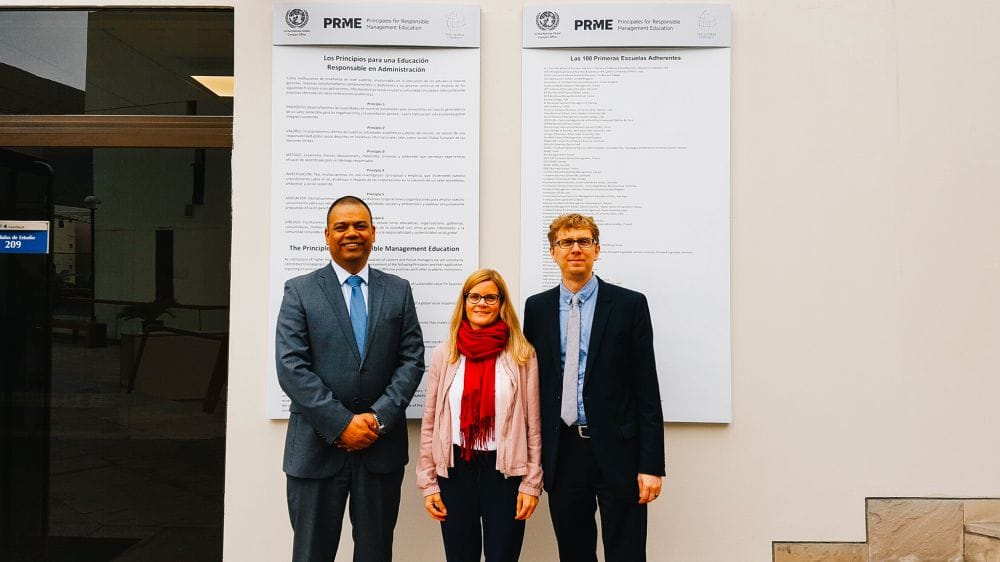
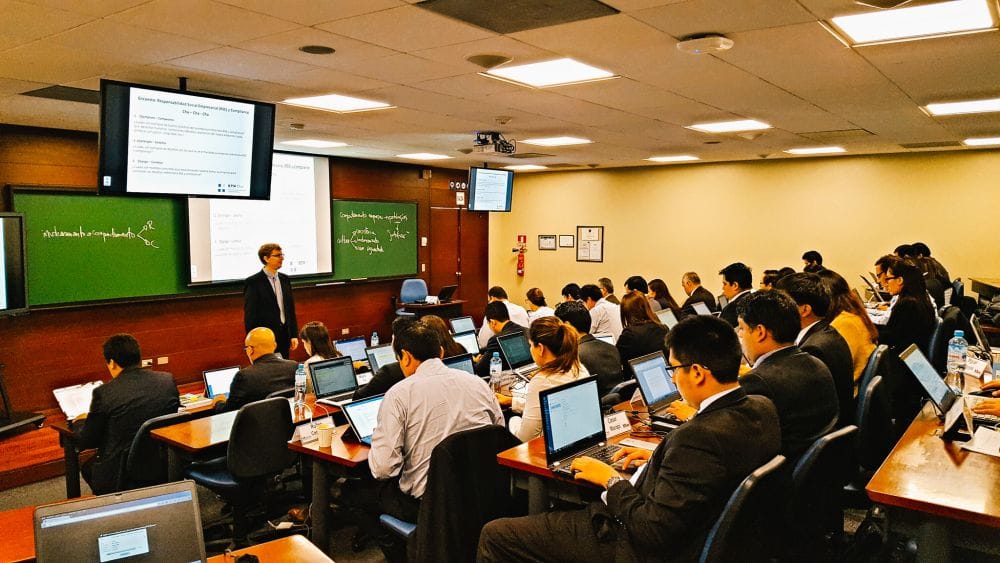
Today we were invited to hold a seminar on CSR and Compliance at CENTRUM Católica Business School. This is a PRME member and part of the Pontificia Universidad Católica del Perú. The event, which is part of the EMBA program, was attended by 40 managers from Peruvian companies. The discussion was very stimulating, as everyone could contribute concrete examples from their daily work.

Christian Hauser, Carolin Deiner and Sandro Sanchez with EMBA students of CENTRUM Católica Business School
Sunday doesn’t seem to be a day in Lima when people go out to eat. Many restaurants remain closed or have shortened opening hours.
Today, for the first time, an interview partner did not appear at the agreed appointment. The head of the institute and the secretary do not agree whether the intended interviewee works at the institute or not. Even if the originally planned interview did not take place, I was still able to have an interesting interview with the director of the institute, Giovanni Bonfiglio.
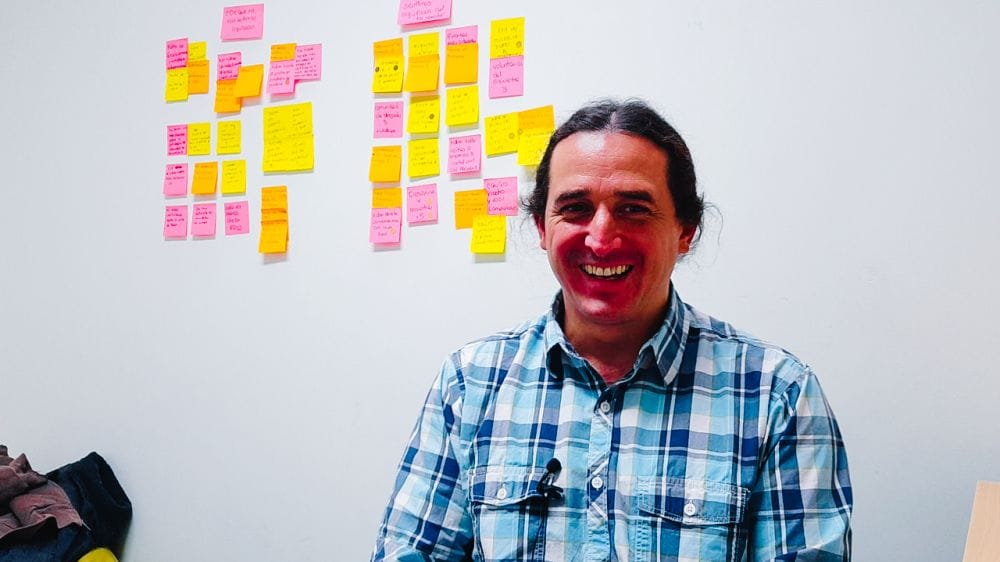
Javier Perla, Head of Sustainable Management at Libélula - Management in Climate Change and Communications, stresses that the CSR discussion must focus more on the question of how and with what methods a company earns its money. So far, the focus has been too much on how the company distributes part of its profits in projects with its stakeholders (philanthropy).
Cinema evening: “Gemelos sin cura” is a mix-up comedy with the Peruvian comedian Pablo Villanueva called Melcochita. The film is about the unequal twin brothers Pedro and Pablo. A priest and a bar musician on the run from unscrupulous debt collectors. Humour that needs getting used to.
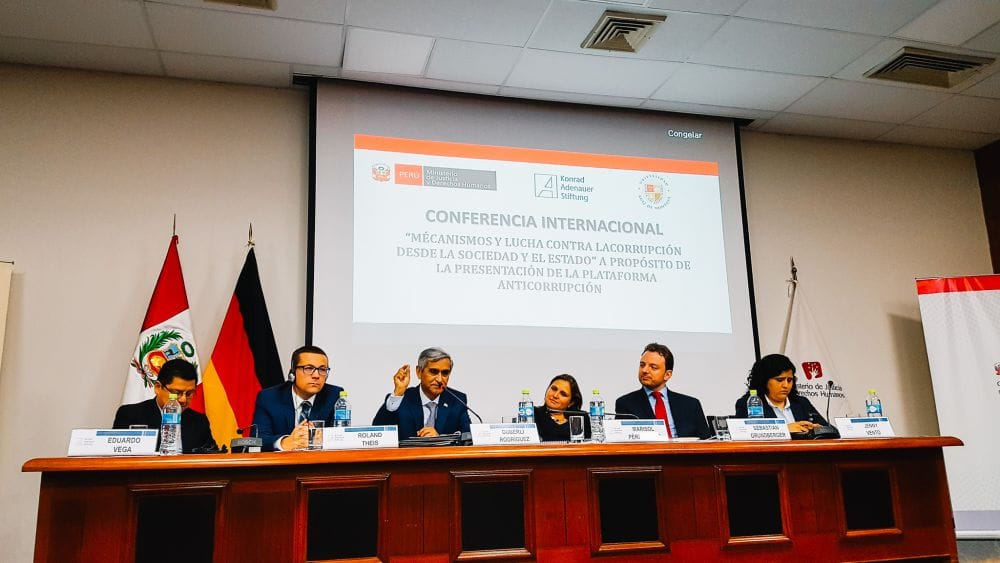
Today we take part in the international conference on the fight against corruption organised by the Konrad Adenauer Foundation and the Peruvian Ministry of Justice and Human Rights. Since we are now regarded as representatives of the German Embassy, we are given preferential access.
The Peruvian government has declared that it intends to take tough action against corruption. This is made clear by President Pedro Pablo Kuczynski in February 2017 in a television address on the corruption scandal surrounding the Brazilian construction company Odebrecht in Peru and he names the concrete measures his government is taking to prevent corruption:

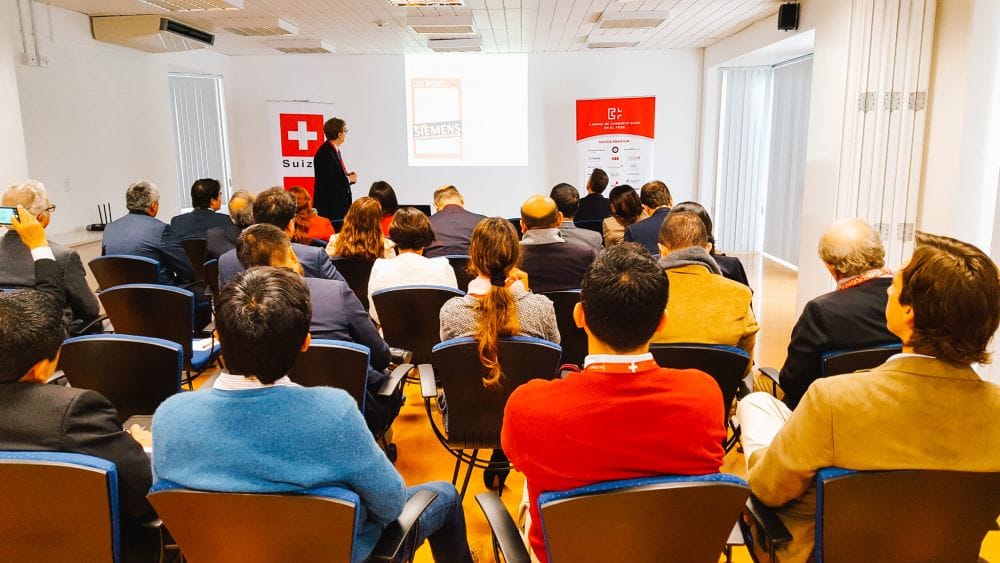
Today I am giving the lecture “Lucha empresarial contra la corrupcion: enfoques y experiencias suizas” at the Swiss Embassy. The event, which will be attended by 27 company representatives, will be organized by the Swiss Chamber of Commerce in Peru. Many thanks to Corinne Schirmer and her team!
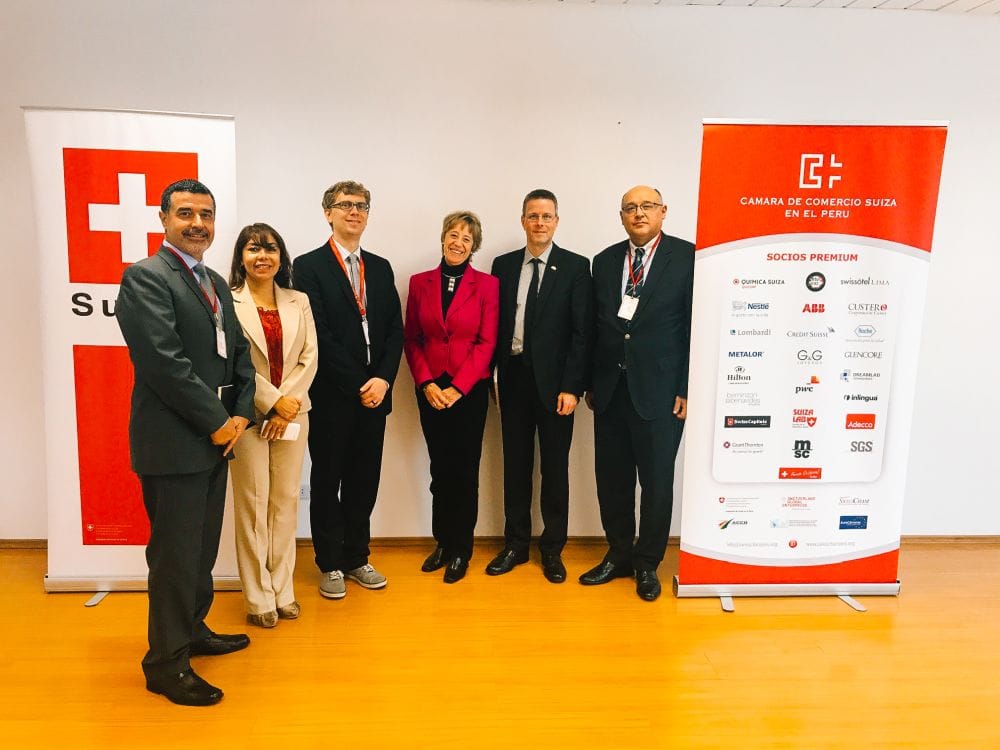
Christian Hauser after his lecture, among others with Corinne Schirmer, Managing Director of the Swiss Chamber of Commerce (3rd from right), and Christoph Sommer, Counsellor of the Embassy (2nd from right).
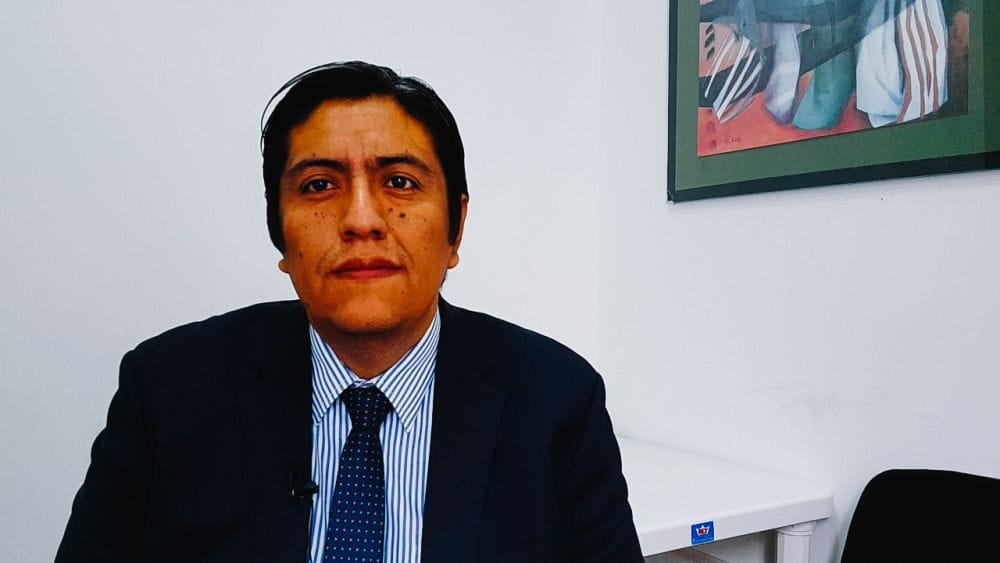
According to Luis Enrique Aguilar of CHS Alternativo, multinational companies should proactively lobby for the alignment of national standards with international standards as they lobby for other issues. This would ensure a level playing field for all companies and reduce risks for themselves.
On the last evening in Lima we watch the Peruvian film comedy “Once machos” in the cinema. A team of after-work kickers gets involved in a football match against a professional team and bets their houses for it. They want to tear down a real estate shark to build a shopping mall. Happy end pre-programmed?
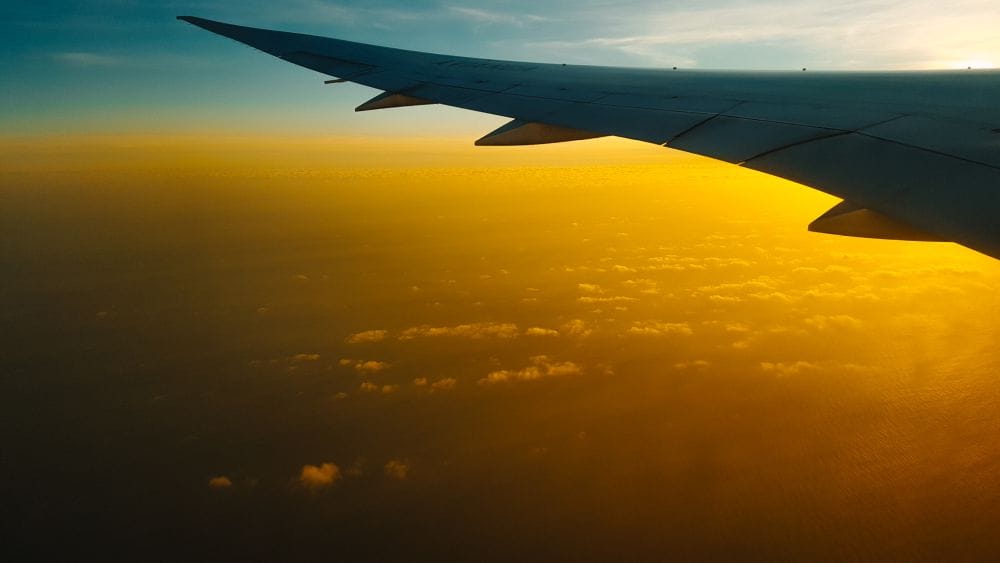
After 18 days in Lima, it is time to say goodbye today, continuing at 17:29 with flight AV0024 direction Bogotá.
Colombia
August 13 – 30, 2017Fun-Fact: The difference in altitude between Lima (161 m a.s.l.) and Bogotá (2640 m a.s.l.) causes the rolling ball to be thrown out of an almost empty deodorant bottle.
In Colombia, people seem to go to work very early. Many appointments for our interviews are offered much earlier than in Mexico or Peru.
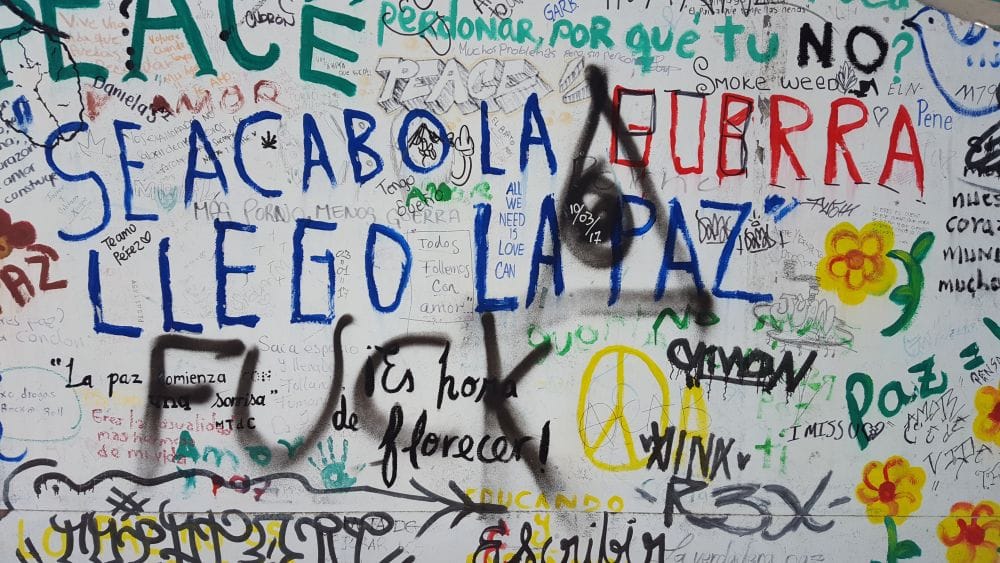
In blue and red letters, you can read what moves Colombia: The war is over, peace has come.
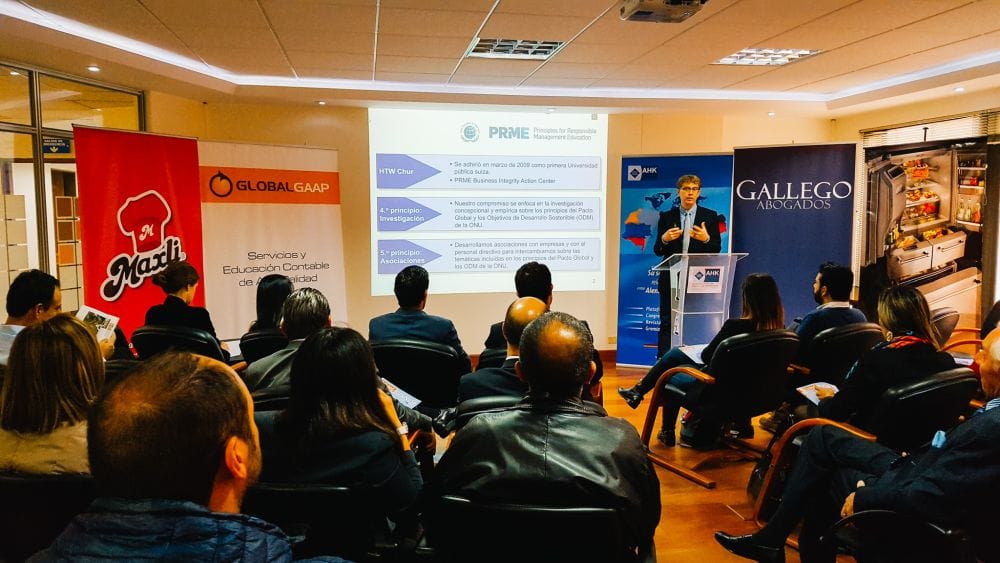
The AHK Colombia in cooperation with the Swiss Chamber of Commerce in Colombia invites you today to my lecture “Lucha empresarial contra la corrupción”. Many thanks to Yolanda Rodríguez and her team!
Carlos Lozano of Coresponsables points out that no superhero, like Batman or Superman, will come to save Colombia. Rather, the Colombians themselves are called upon to tackle the country’s social and ecological challenges.
The “pico y placa” system has been in use in Bogotá since 1998 to prevent traffic congestion. During peak hours (“pico”) between 6 a.m. and 8 a.m., as well as between 3 p.m. and 7.30 p.m., cars with certain final digits of the number plate (“placa”) are not allowed to drive in the city area. Every day different end digits are affected. Failure to do so may result in drastic fines.
The Black Forest is represented everywhere. In our accommodation in Bogotá, you can find Hansgrohe bathroom taps.
In the Hacienda Santa Barbara shopping centre in Usaquén, visitors will be invited to attend Holy Mass at 11 a.m. via loudspeakers. The loudspeaker announcement is repeated several times.
Walking longer distances through the city is not common in Latin America. As in Mexico City and Lima, most people in Bogotá find this way of exploring the city rather strange.
Every Sunday the Mercado de las Pulgas takes place in Usaquén, the 1st district of Bogotá. Craftsmen and street artists offer their goods for sale.
Ascension was on the 15th of August. Colombians postpone most of the holidays to the following Monday, thus extending the weekend. They make “puente” (bridge). This regulation goes back to Raimundo Emiliani Román and is therefore called Ley Emiliani. The regulation is intended to promote Colombian tourism.
Originally we had three appointments for today. Luckily, we contacted all the people we talked to again. Two of them didn’t have the holiday on their screens. If we hadn’t asked, we would have been at the supposedly first appointment at 8 o’clock in front of a locked door.
A taxi driver complains that there are too many holidays in Colombia and therefore too little work. He says the government would invent a holiday for everything, to distract people from the real problems: “As long as they celebrate, they don’t complain”.
According to Lothar Witte, head of the FES foreign office in Bogotá, three dangers for pedestrians lurk today in the better quarters of the city: 1) to be robbed by trick thieves, 2) to be run over by cyclists, 3) to injure one’s ankle in one of the numerous street holes.
Compared to the other two capitals, Mexico City and Lima, the road infrastructure in Bogotá is apparently much worse. Numerous potholes can also be found in the streets of the better neighbourhoods.
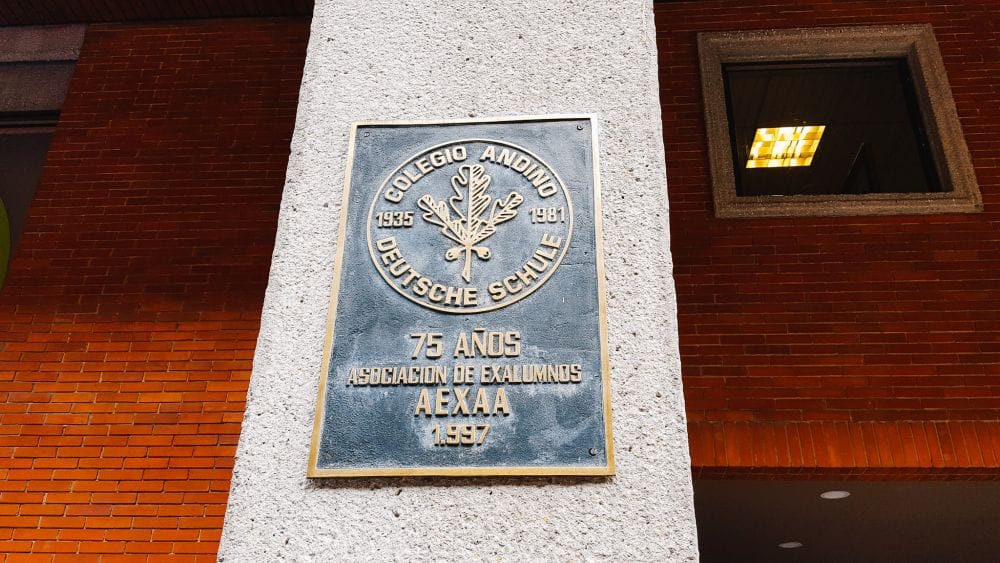
The Andino Shopping Centre is located on the former site of the German School. In June 2017, a bomb attack was carried out on the women’s toilet, killing three people. Therefore, explosive detection dogs are now being used at the entrances.
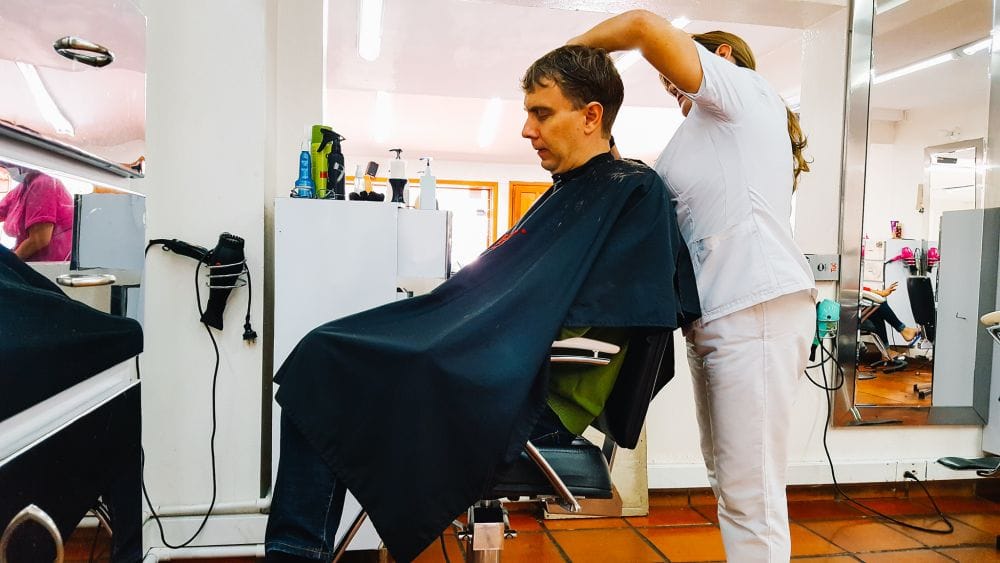
Economic theory self-tested: hairdressers’ appointment in Bogotá. A male haircut costs COP 9,000; the equivalent of EUR 2.60 or CHF 2.95. The Balassa effect works ;-)
Today a trained shoemaker drives us. The competition from China is too overwhelming. That’s why he has been driving his wife’s car for Uber for four months now.
Official launch of the Better Gold Initiative in Colombia with ceremony in the residence of the Swiss Embassy. The aim of the initiative is to sustainably develop the small gold mining industry in Colombia and integrate it into the supply chain of the Swiss gold industry.
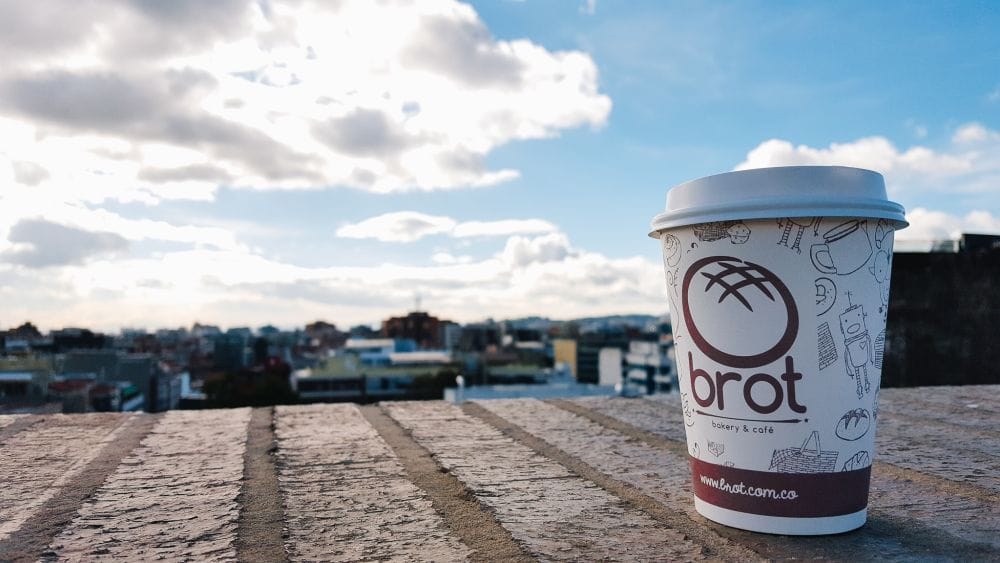
In the bakery “Brot”, you are asked if you want to have your bread cut open. If the answer is in the affirmative, the seller cuts the bread open by hand.
Today we watched the documentary “Amazona” in the cinema. It describes the life of the British hippie dropout Valeria Meikle, who had left her young children to live in the Colombian jungle. She is of the opinion that a mother should not sacrifice herself for her children, but live her own dreams. In return, children do not have to sacrifice themselves for their parents.

The local mountain Montserrat offers an impressive view over the megacity Bogotá. The view from above clearly shows the dimensions of the megacity.
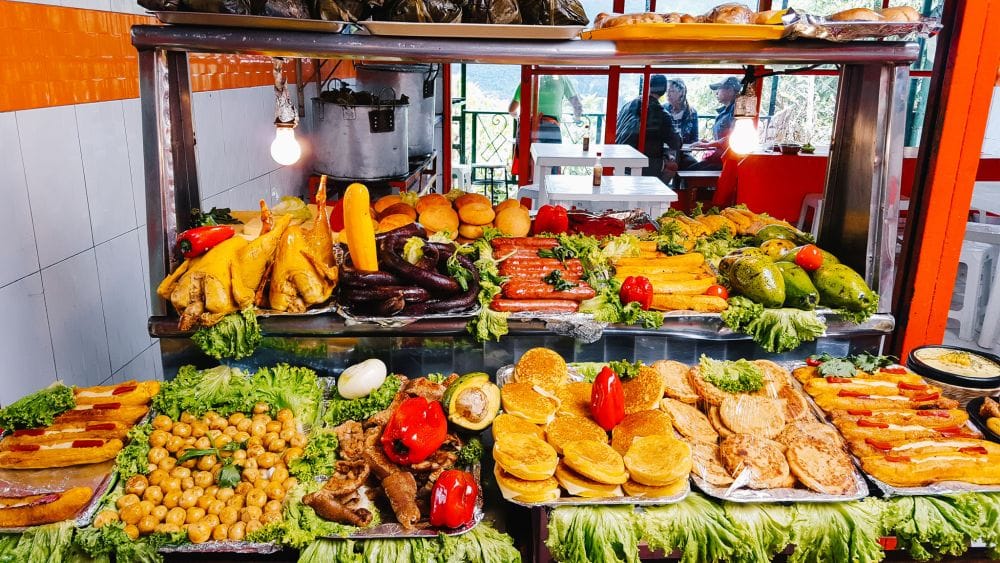
In order to strengthen the tourist’s position on the Montserrat Mountain, there are numerous snack stalls offering regional specialities.
Meeting with Diana, a cousin’s sister-in-law. We meet at the Parque de la 93 in Chicó, the district where our accommodation is located. Diana greets us by saying that she couldn’t live here, it would be too “orderly” for her. She has just bought a flat in the centre. In a “barrio bien popular”. Due to the location, the apartment was very cheap. Now she is hoping for the gentrification of the neighbourhood, as the city is planning a metro line that will have a stop nearby. To get an idea of the quarter, she goes to the apartment at different times of the day and week, which is currently being renovated.
Today we drove for the first time with a female Uber driver. She told us that she has been registered with Uber for 1.5 years, but has only been driving regularly for a few weeks because she has lost her job in the commercial sector. Finding a job in Bogotá is difficult; many companies have to close. In addition, many Venezuelans come to the country who accept a job for much less money than the Colombians. This is having an impact on the labour market. Our driver is currently looking for a new job and is working as a driver to bridge the gap.
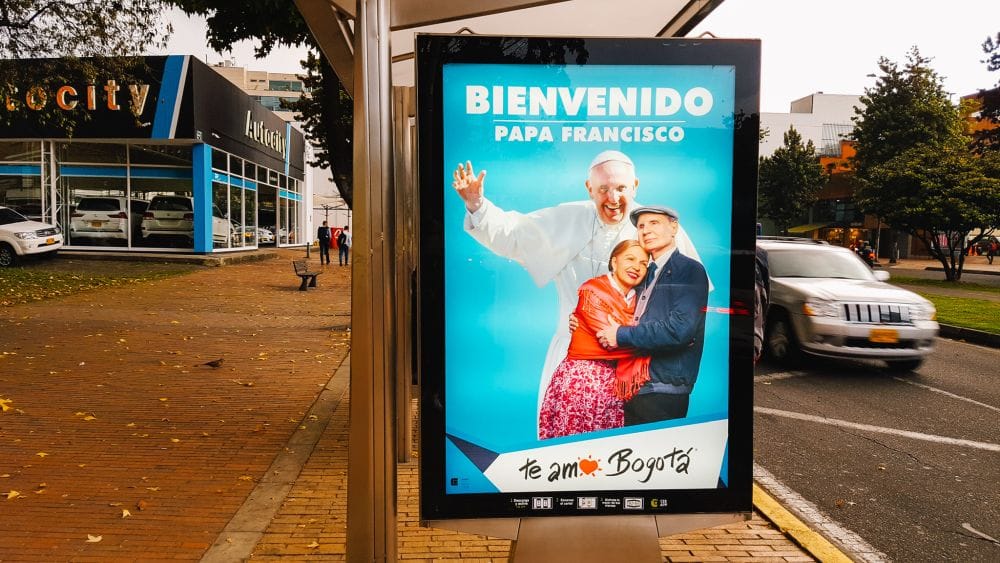
Bogotá is preparing for the visit of Pope Francis. He is planning an apostolic trip to Colombia from the 6th to 11th September to support the reconciliation process between the government and the guerrilla groups.
After 19 days in Bogotá, we will continue today with flight AV0085 to São Paulo. The second night flight of the journey is scheduled. Departure is at 22:04 o’clock. After about six hours flight time, the landing will take place about 6:15 o’clock local time. The time difference between Colombia and the east coast of Brazil is two hours.
Brazil
August 31 – October 6, 2017Brazil is one of the first countries to qualify for the 2018 FIFA World Cup in Russia. Today’s 2:0 against Ecuador is the 9th victory in a row in the World Cup qualification.
Visit to the Latin American Regional Office of the Alliance for Integrity in São Paulo. The global multi-stakeholder initiative actively supports me in the implementation of the research project by arranging dialogue partners. Thank you very much!
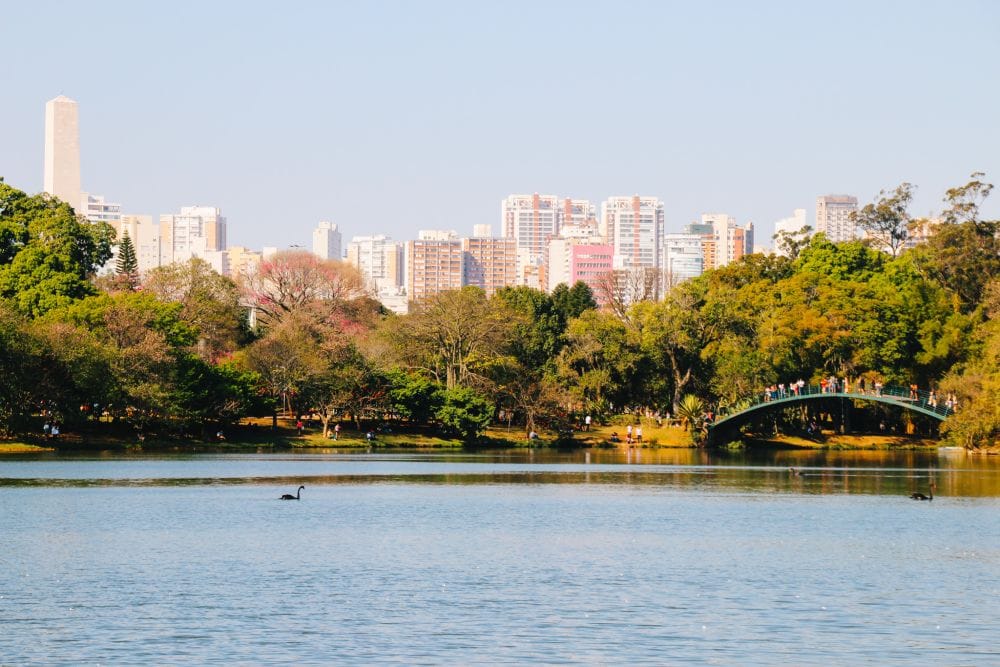
Many Paulistanos use the weekends to visit the city park Ibirapuera. In the park, there is the Museu Afro Brasil which is dedicated to the Afro-Brazilian history and culture. There is also a Code of Conduct for slave owners from 1870: “Instruções para a administração das fazendas” (“Instructions for farm management”).
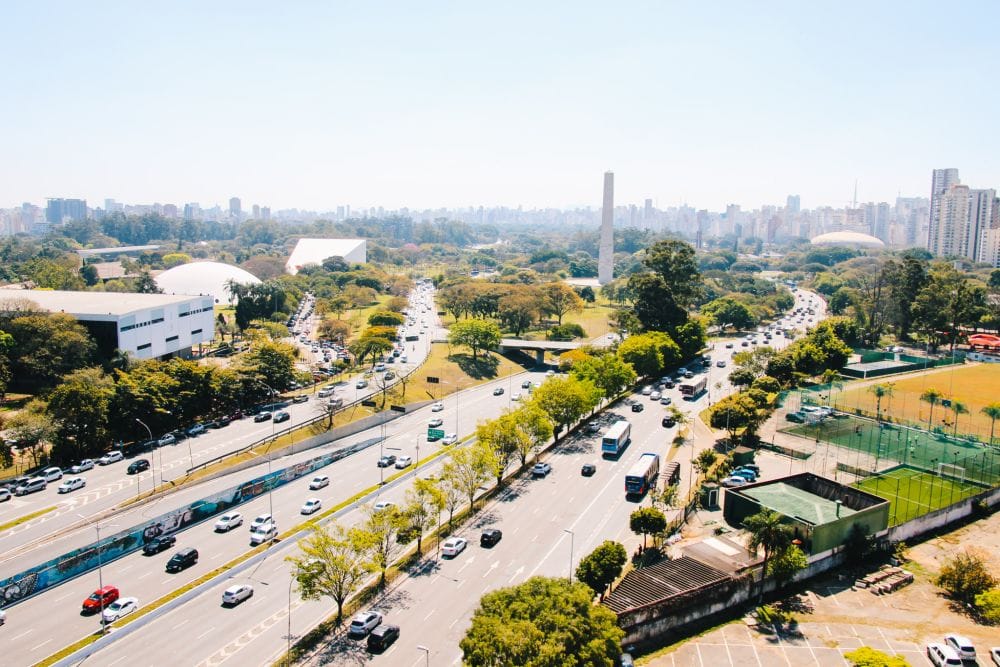
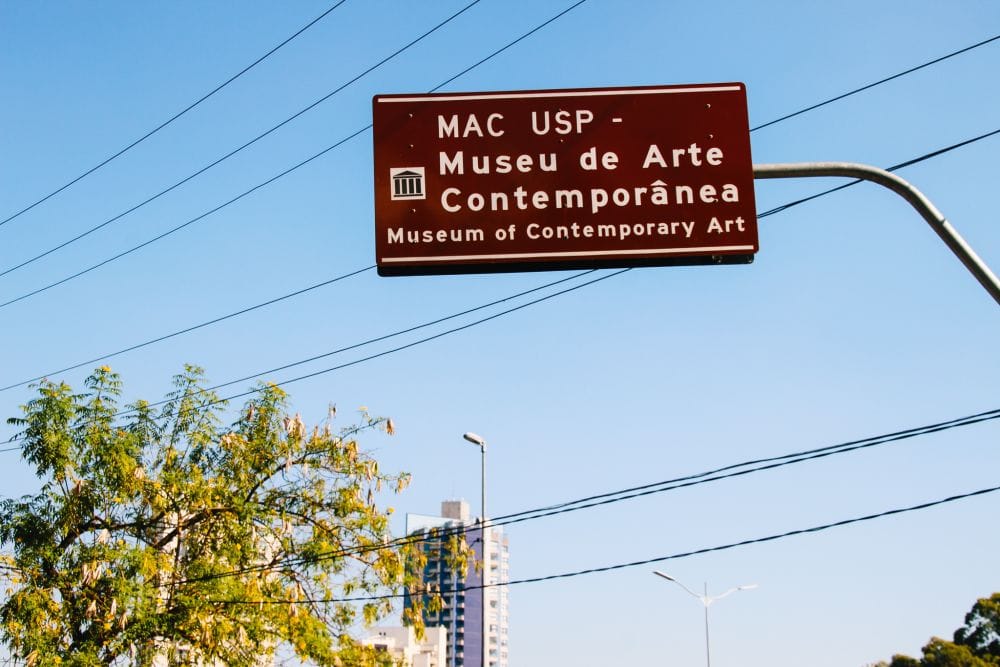
The Museu de Arte Contemporânea (MAC USP) in São Paulo is one of the largest museums of contemporary art in Latin America. It also offers a beautiful view of the city.
In an apartment in Salvador (Bahia), the Brazilian Federal Police today found cash worth BRL 51,030,866.40 (EUR 13,744,000/CHF 15,656,600). The largest cash find in the history of the country. The cash was stored in several suitcases and cardboard boxes. The apartment was used by former minister Geddel Vieira Lima (PMDB). Officially, the residence was used to store the belongings of his father, who died last year.
Avenida Paulista is the economic and cultural centre of São Paulo. The Swiss Consulate General with the Swiss Business Hub is also based there. The Business Hub is an important point of contact for Swiss companies wishing to do business in Brazil.
Today I gave a lecture in the framework of the Anti-Corruption Working Group of the Brazilian Network of the UN Global Compact. The current corruption scandals give companies in Brazil a strong impetus towards a more transparent and integrated business culture. However, it is expected that cultural change will continue for decades to come.
The largest favela – i.e. slums – in São Paulo, Vila Nova Jaguaré, is located in the vicinity of the Roche company site. After one of the company’s service providers was attacked and killed in front of the company’s premises, the company developed a programme that helped to improve conditions in the favela.
Quote from an Uber driver: “São Paulo is not a city to live in, but a city to work in”. This is why all those who can afford it leave the city on a holiday like today’s Brazilian Independence Day. On 7 September 1822, the Portuguese crown prince Dom Petro proclaimed Brazil’s independence with the Grito do Ipiranga.
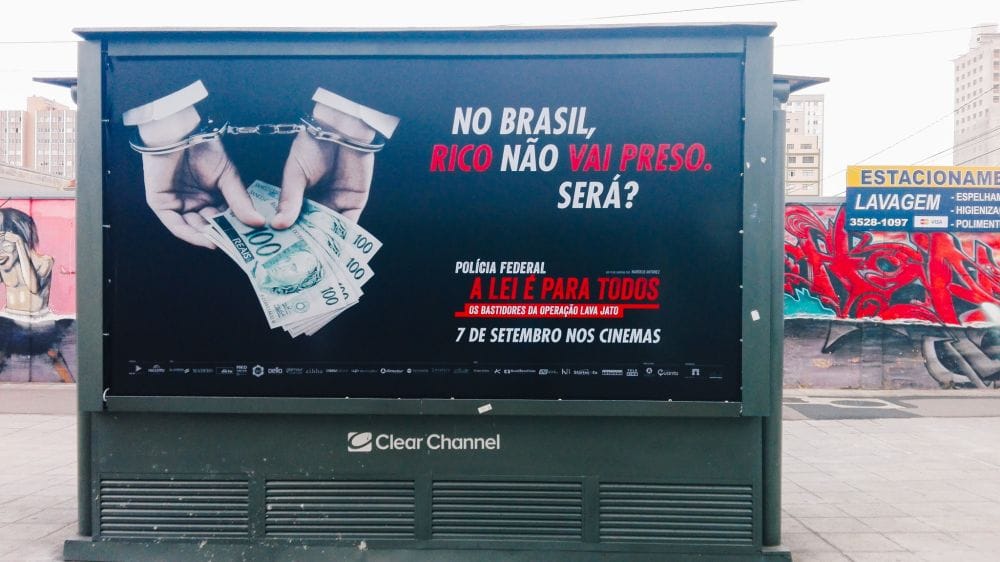
The Brazilian feature film “Polícia Federal - A Lei é Para Todos” (in English: The law applies to everyone) tells the story of the beginnings of Operação Lava Jato (Operation Jet Wash). This started the biggest corruption scandal in the history of the country. Critics complain that the film is based on true events, but does not deal with them in a historically correct way. In some cases, the film is interpreted dramaturgically freely. It is always excitingly staged.
On the north-south corridor Avenida 23 de Maio, traffic flows largely smoothly at weekends. On weekdays, the situation is quite different: Multi-lane car avalanches then roll for kilometres in the direction of the city centre or out of the megacity.
Today, after eleven days in São Paulo, we continue our journey to Curitiba. The capital of the Brazilian state of Paraná has about 1.9 million inhabitants. For the first time on this trip I am not staying in a megacity with more than 10 million inhabitants.
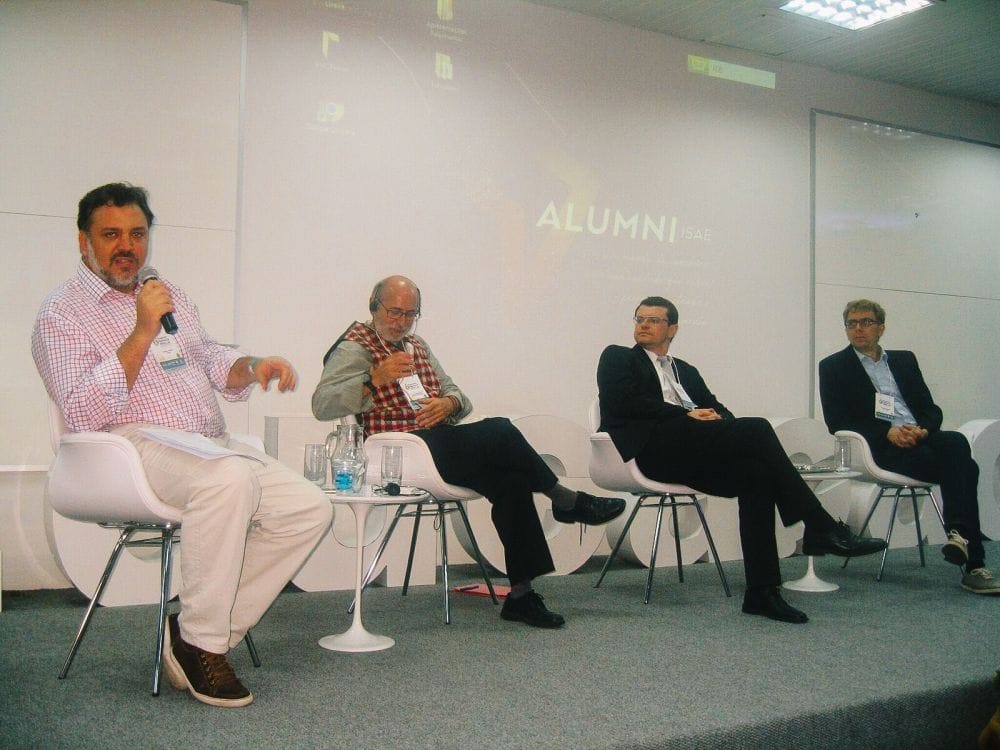
In the context of the 6th regional meeting of the PRME Chapter Latin America, I participated in a panel discussion on “CSR in Latin America” and presented the first results of my research trip. University representatives from numerous countries in the region discussed how responsible management can be anchored more strongly in research and teaching at universities and business schools.
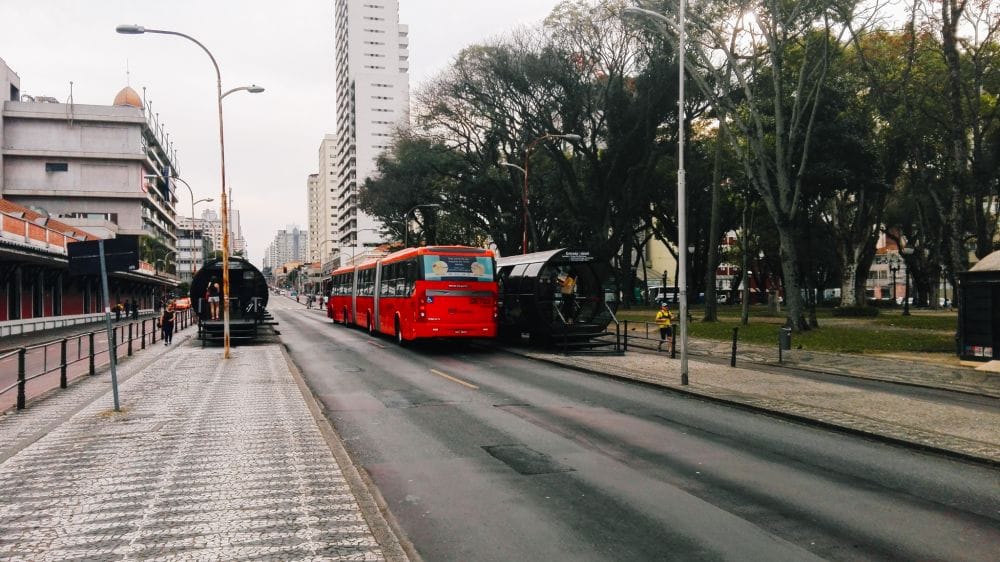
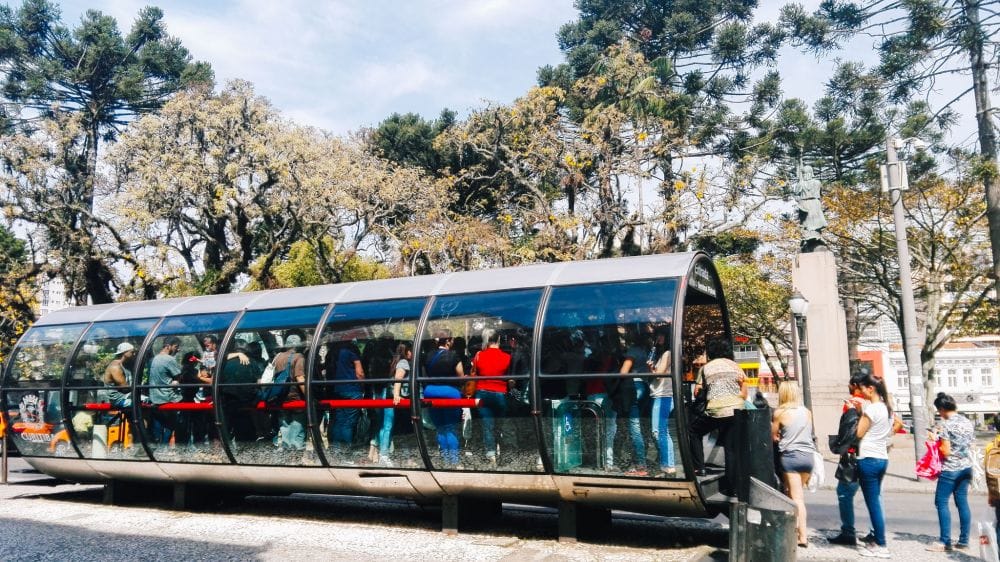
Curitiba has been a model for urban development in Latin America since the 1970s. The city had the first pedestrian zone and the first Metrobus system in the region.
The 4th RME Research Conference is a complete success. More scientists than ever before present their research results for discussion at the conference. The conference was first launchedin 2014 at the HTW Chur.
Within the panel discussion “Leaders training for SDG 16 - Peace, justice and strong institutions”, I discussed with colleagues and company representatives from Latin America the role of higher education and in-company training in achieving the goals for sustainable development of the United Nations.
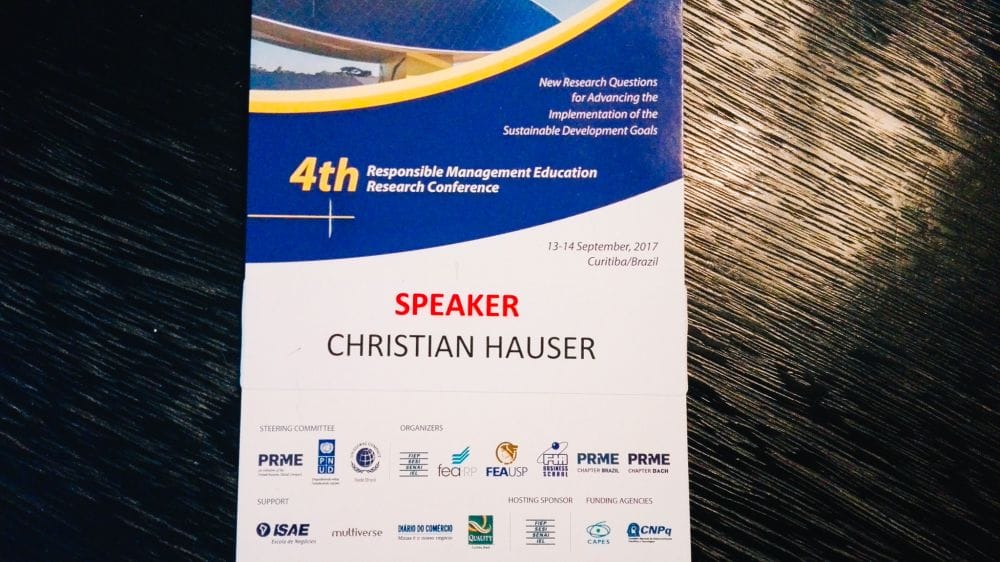
Today I am giving a lecture on “Corruption in international business” at the 4th RME Research Conference. The topic is highly relevant for Brazil and is discussed with corresponding interest.
Paraná is regarded as one of the states with the best education system in the country. According to a media report, however, there are schools that have not yet received any textbooks even ten months after the start of the school year.
The Museu Oscar Niemeyer in Curitiba is colloquially also called Museu do Olho (Museum of the Eye). It was designed by the Brazilian star architect Oscar Niemeyer, whose most important works are also on display in the museum.
Impressions from Brazil’s oldest pedestrian zone.
Today we travel from Curitiba to Rio de Janeiro in an Embraer 190 aircraft. The Brazilian company Embraer is the world’s fourth largest aircraft manufacturer.
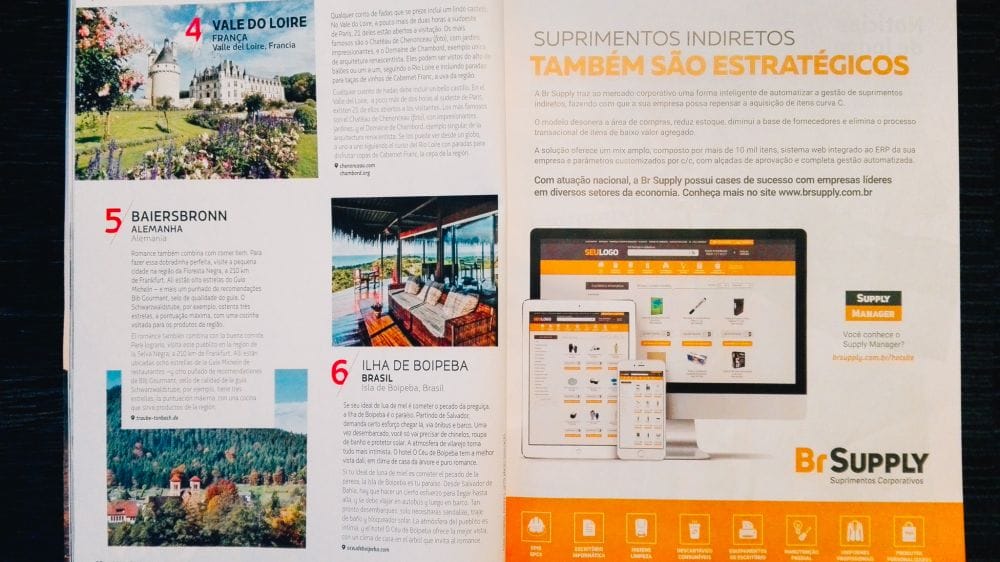
In the in-flight magazine of Latin America’s largest airline LATAM, Baiersbronn in the Black Forest in Germany is recommended as one of the world’s six most romantic places to spend a honeymoon.
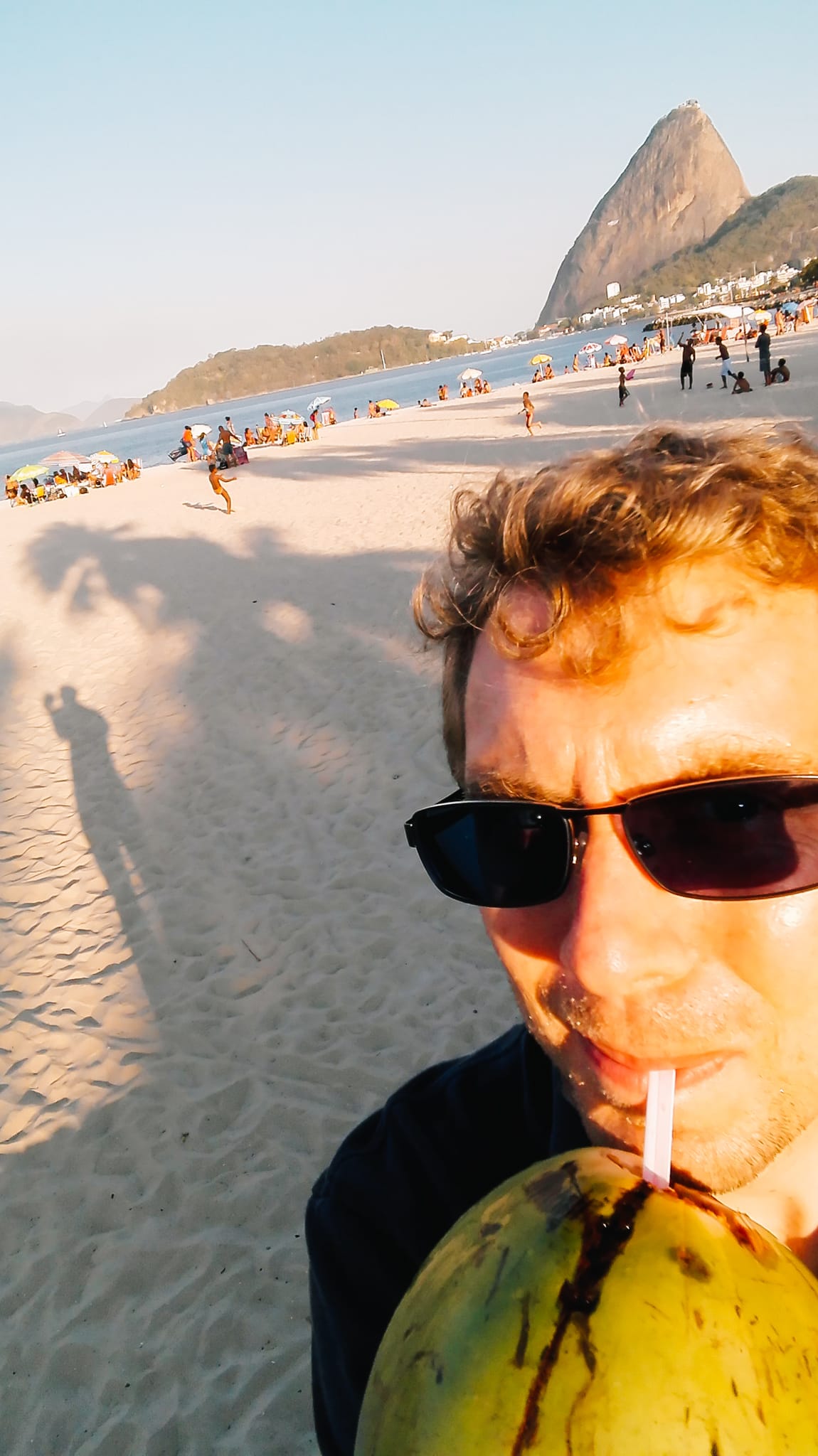
In the evening I have coconut with Sugarloaf. Delicious ;-)
The economic crisis has hit Rio de Janeiro hard. Many try to supplement their salaries with apps like Uber or earn their entire livelihood with them. As the saying goes: “Está faltando emprego, mas não está faltando trabalho” (“There is work, but there are no jobs”).
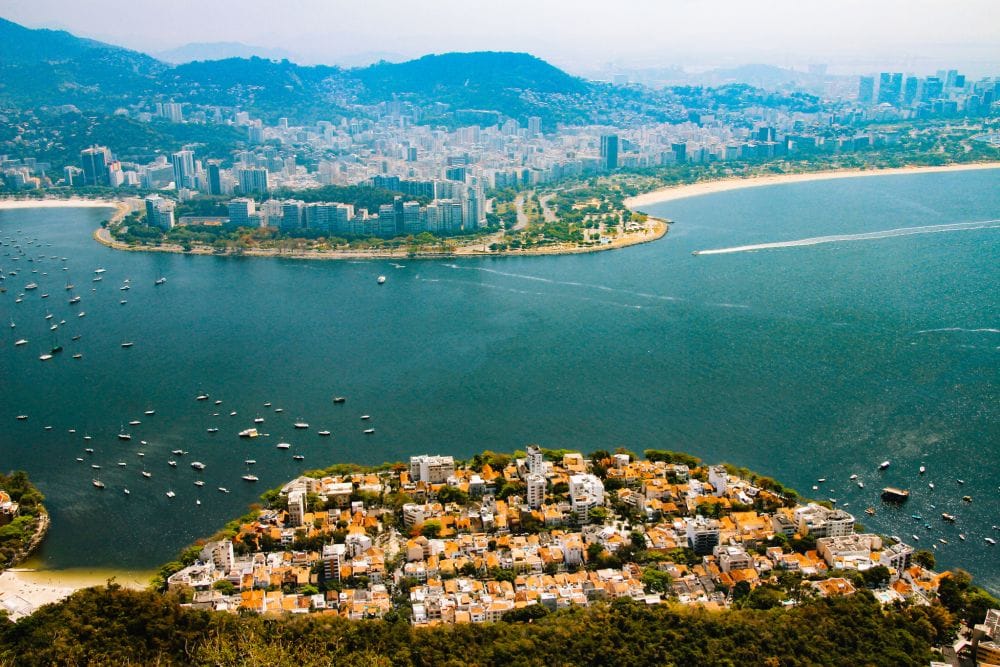
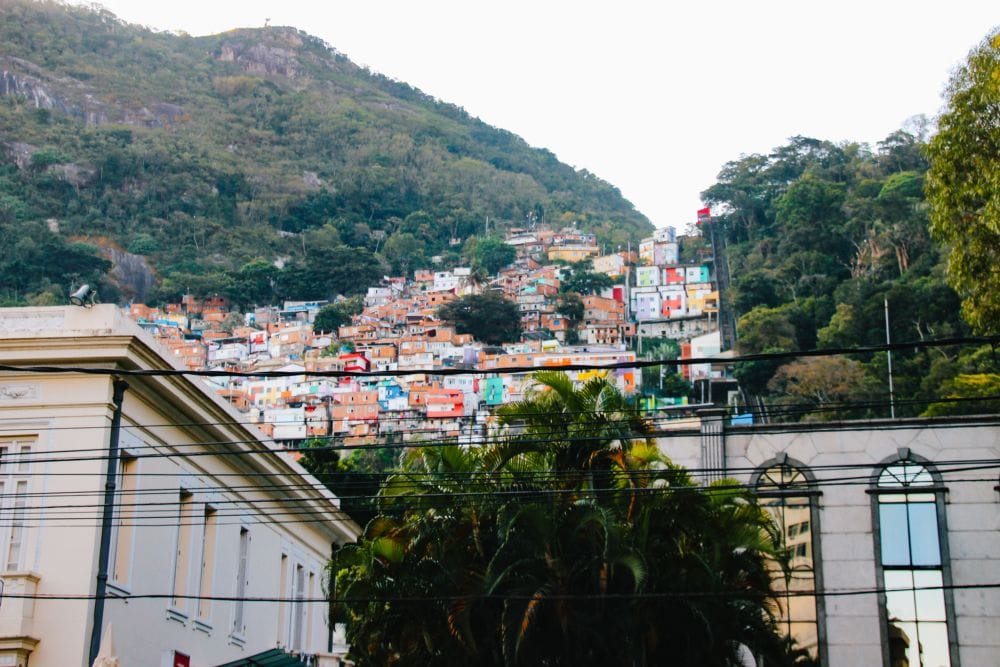
Some impressions from the “Cidade Maravilhosa”
Recently, when helicopters were circling the noble neighbourhoods in the southern part of Rio de Janeiro, it was known that another house search was being carried out as part of Operation Lava Jato. Today, however, the helicopters are on their way because of the massive outbreak of violence in the favela Rocinha.
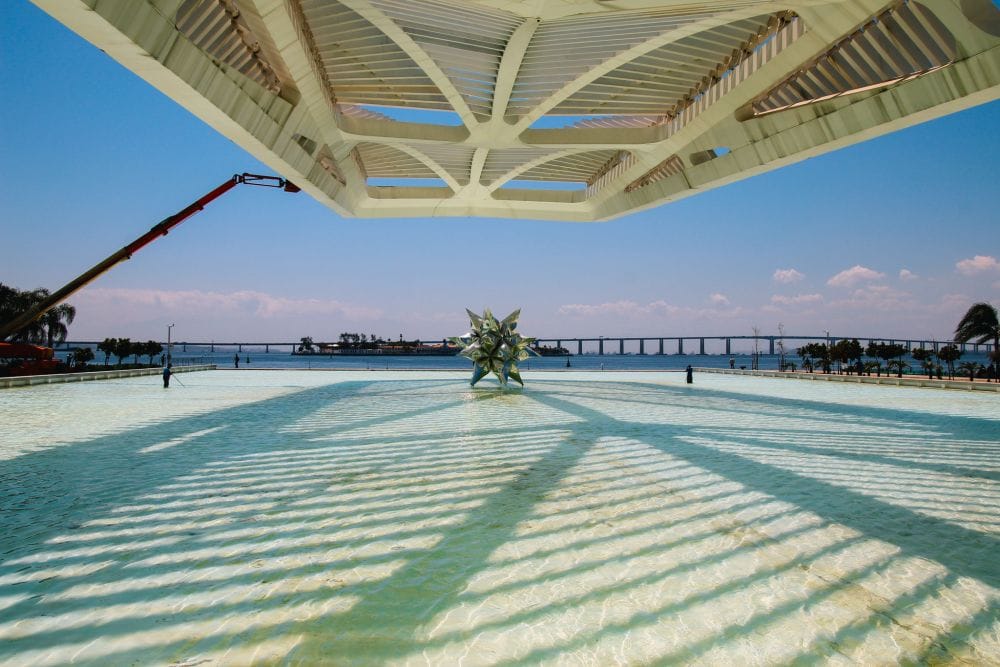
The old port area of Rio de Janeiro was revitalised for the 2016 Summer Olympics. Today, the area is also a popular excursion destination thanks to the futuristic Museu do Amanhã (Museum of Tomorrow) by the Spanish-Swiss star architect Santiago Calatrava.
In Rio de Janeiro, the violence has reached such proportions that the companies in the city centre have joined forces and launched the “Centro presente” initiative. Now armed private security guards are patrolling the city centre in addition to the police.
The so-called ponte aérea (Air Bridge) connects the two city airports of Rio de Janeiro (Santos Dumont) and São Paulo (Congonhas). There are more than 120 daily flights on this route. Originally I was booked on the 17:15 flight. Since I arrived early enough at the airport, I was able to take the flight at 16:45 without any problems.
This morning, at the invitation of the Swiss-Brazilian Chamber of Commerce, I gave a lecture on the prevention of corruption. Many thanks to Stefania Hertach and her team for organizing this successful breakfast event!
Afterwards, a turboprop aircraft of type ATR 72 will take us from Viracopos Airport in Campinas to Dourados. The Viracopos airport is a good 100 km from São Paulo and is becoming increasingly important for passenger traffic as the other airports in the region (Congonhas and Guarulhos) reach their capacity limits.
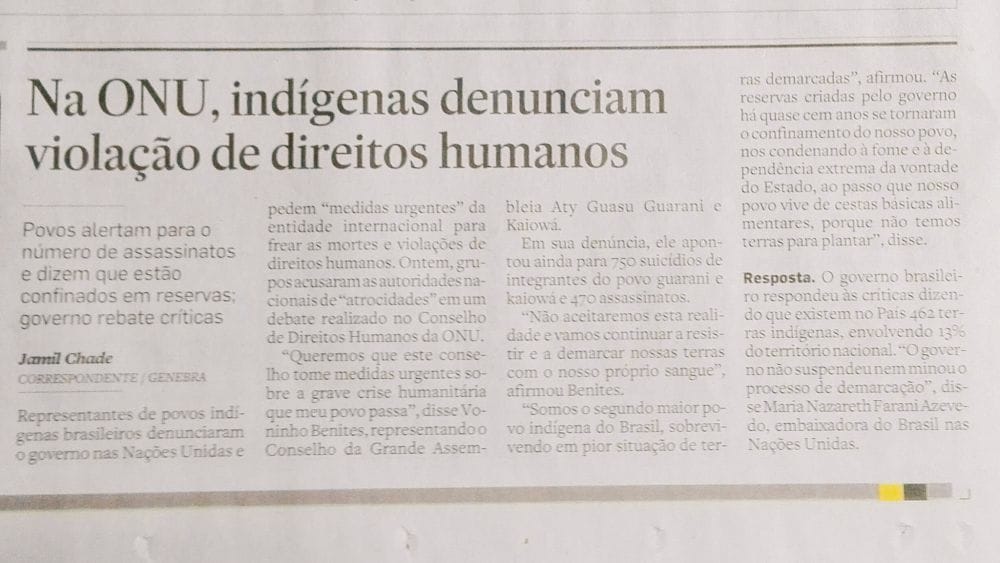
The newspaper reports that representatives of the Guaraní-Kaiowá indigenous ethnic group from Mato Grosso do Sul are currently in Geneva to demand the rights of indigenous peoples before the United Nations Human Rights Council. Against the backdrop of continuing land conflicts in the region, 470 Indians have been murdered in recent years and 750 have committed suicide.
According to another newspaper report today, 46% of urban households in Brazil are not connected to the sewage system. In rural areas, the figure is even higher.
Today we took the bus from Dourados to Iguatemi for five hours. There, I visited the project of the Franciscan Father Áldio Rosá. He has been campaigning for the rights of the indigenous population for decades. For his commitment, he was recognized as Defensor dos Direitos Humanos da Secretaria de Direitos da Presidência da República. After repeated death threats, his premises are secured with numerous video cameras. There are also cameras in the house. The pictures are transmitted directly to the (federal) police in Brasília.
The development organisation Oxfam is today posting a report on the unequal distribution of income and wealth in Brazil. The report concludes that the country has made progress in recent decades. However, development has been very slow. Brazil is therefore still one of the countries with the largest gap between rich and poor in the world. In the course of my research trip, I got to know different facets of these very different realities.
One goal of Father Álido’s project is the reforestation of the cleared areas that the indigenous population has received back. For this purpose, seedlings of various indigenous plant species are grown.
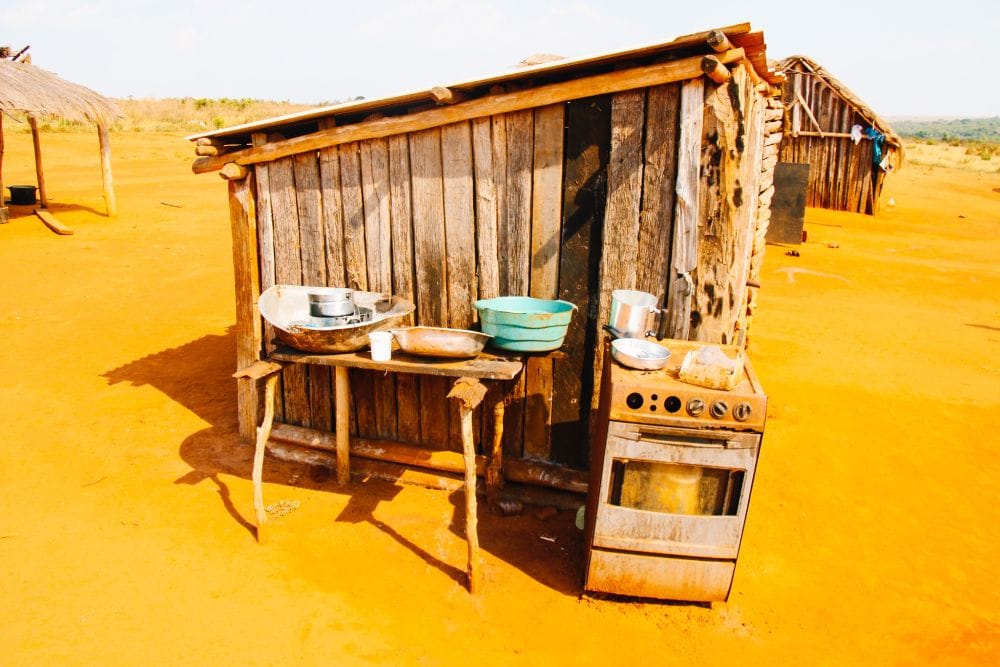
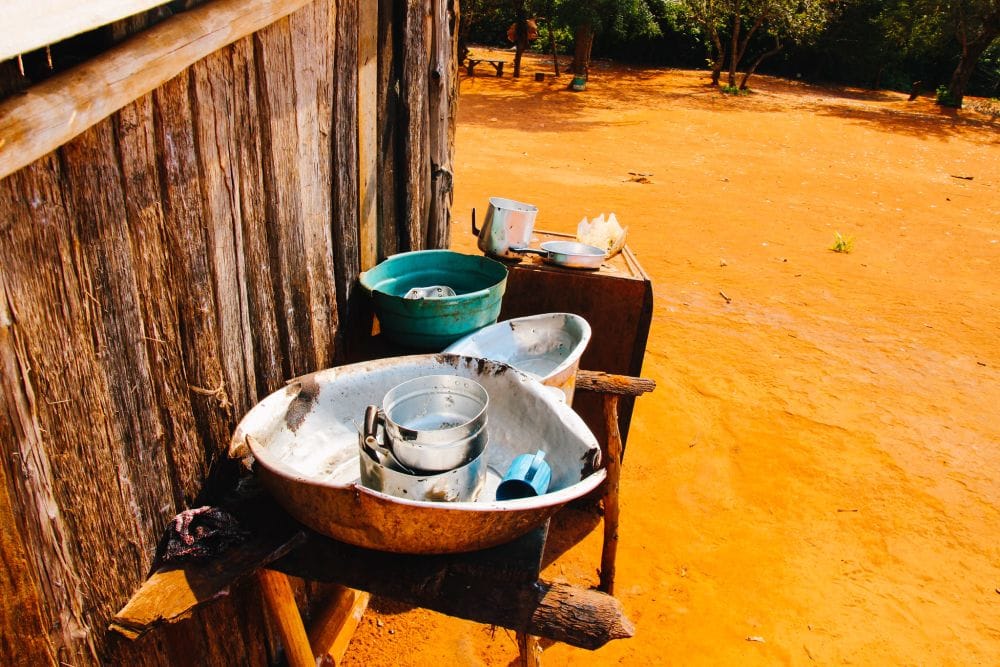
The Aldeia Pyelito, in which 58 families live, has neither electricity nor wells. The water comes with trucks. No cestas básicas have been delivered for three months. The reason for this is unknown.
Tuberculosis is widespread in the Aldeias. It is therefore strongly discouraged to share their traditional drink Tereré, mate tea infused with ice water, with the indigenous population.
In the Aldeia Yvy Catu, access to drinking water is not a matter of course. Often surface water is used that is dragged in from afar. The revitalisation of deep wells is therefore an important goal of Father Álido’s project. A big challenge here is that there is no electricity.
In Brazil, numerous humanitarian projects depend on donations from abroad. “Smile, these are the people who finance our salary” was therefore the recommendation of a woman when a group of donors from Germany recently visited them.
In Brazil, many adults wear braces to have their teeth straightened as soon as they get some money. At the same time you can see many adults who are missing teeth.
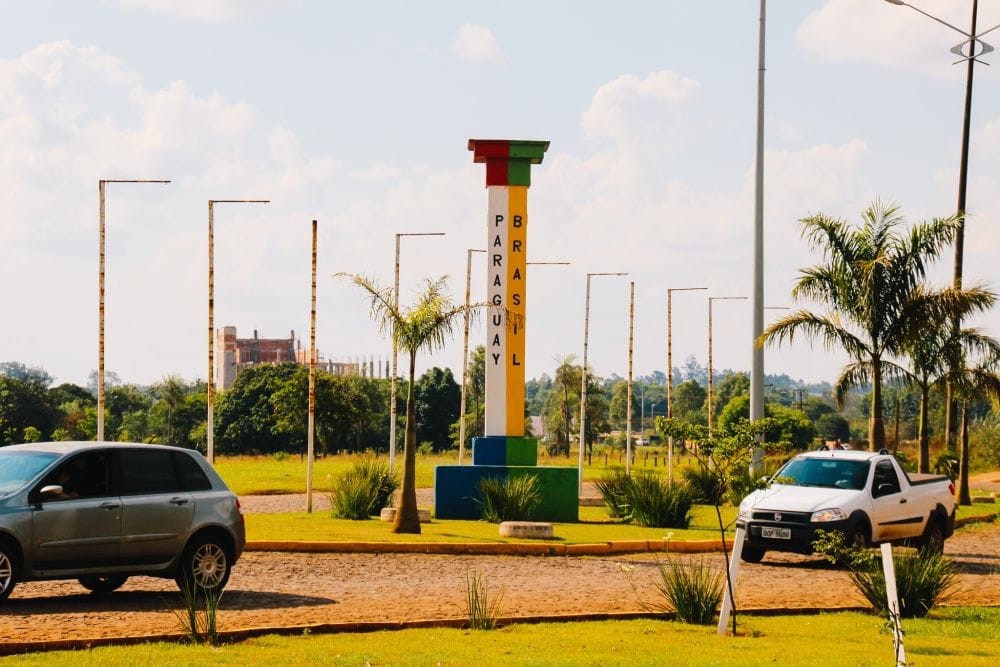
The shopping centers of Pedro Juan Caballero in Paraguay are located directly on the border to Ponta Porã in Mato Grosso do Sul and offer many imported products that are not available or very expensive in Brazil. On weekends the shopping centres are very well frequented.
“The Indians smell like fire.” Whether one really dives into the world of the poor/others can be recognized by whether one smells like them..
The rural exodus and the associated urbanisation have led to the social uprooting of large parts of the population. The enormous success that Evangelical sects have had in recent years is partly attributed to the fact that they offer orientation to these people.
After twelve days in the Brazilian hinterland, we are now heading back to the east coast. With a stopover in Viracopos, I will fly to Porto Alegre. The capital of the Brazilian state Rio Grande do Sul has about 1.5 million inhabitants. The time difference is one hour.
The Brazilian film comedy “Divórcio” by Pedro Amorim tells the story of the Rose War of a rich entrepreneur couple from the city of Ribeirão Preto in the interior of the state of São Paulo: “Morar no interior é um cu”.
The Quinta da Estância eco-farm uses innovative and creative solutions to operate its core business in a socially and ecologically responsible and economically successful manner. The heat from the coal fire in Churrasqueira is also used to generate hot water for hotels and restaurants. A suitable name for the method was also invented: “Banho gaúcho”.
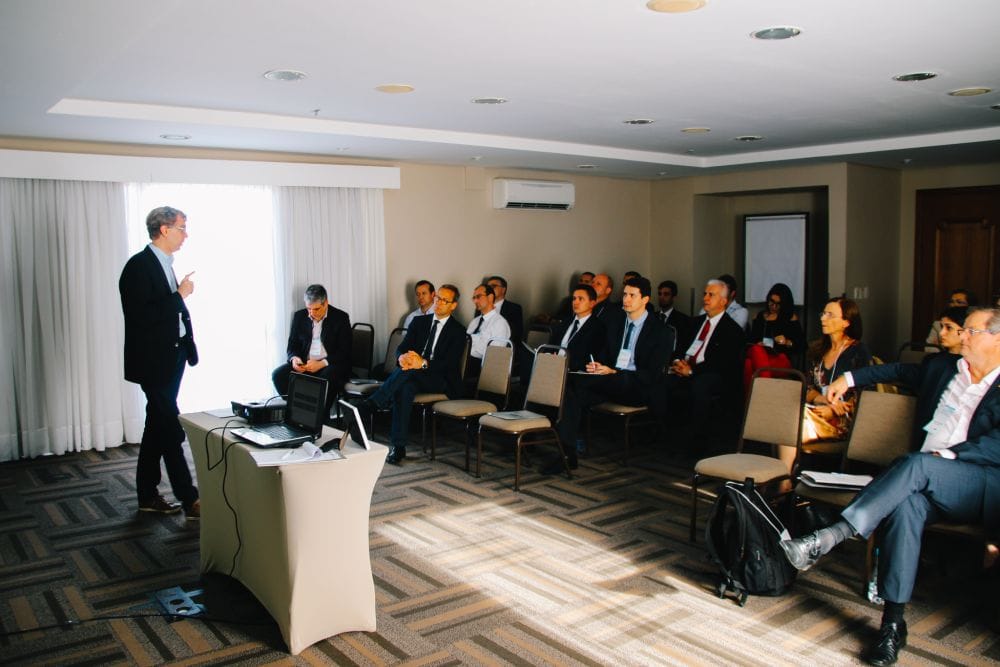
Today, the German-Brazilian Chamber of Industry and Commerce Rio Grande do Sul in cooperation with the Konrad-Adenauer-Stiftung organised the seminar “Ética e Reputação empresarial na visão alemã e suiça”, where I gave a lecture on the topic of corruption prevention.
The president of the AHK Porto Alegre, Everson Oppermann, stated that the interaction of companies with their stakeholders often resembles a battlefield and rarely a space for cooperation.
Matthias Schmidt, Professor at Beuth University of Applied Sciences Berlin, emphasised that companies cannot be responsible for everything. Those who are supposed to be responsible for everything are ultimately not responsible for anything. But a company has to ask itself which responsibilities arise from its core business. A company must define its core values for its core business.
Today, Carlos Arthur Nuzman was arrested in the noble Jardim Pernambuco (Leblon) district of Rio de Janeiro. Nuzman has been President of the National Olympic Committee since 1995 and was President of the Organizing Committee of the 2016 Olympic Games. He is accused of having bought votes in the run-up to the award of the Summer Games to Rio de Janeiro.
On the last evening in Brazil another film comedy: “Chocante” revives the 1990s. Twenty years after their one-hit wonder, the ex-members of a Brazilian boy band try to continue their success. Musically and cineastically unconvincing.
Argentina
October 7 – November 4, 2017After a total of 38 days in Brazil, it is time today to say goodbye to the Portuguese language. Flight AR1231 took us from Porto Alegre to Buenos Aires. The city airport Jorge Newbery is located directly on the bank of the Río de la Plata and only about two kilometers away from the city centre. The drive to our accommodation at the Plaza de la República takes about 15 minutes.

On the first evening in Buenos Aires, a street festival of the Bolivian community awaits us. Until far after midnight, a street parade ran through the Avenida Diagonal up to the Plaza de Mayo.
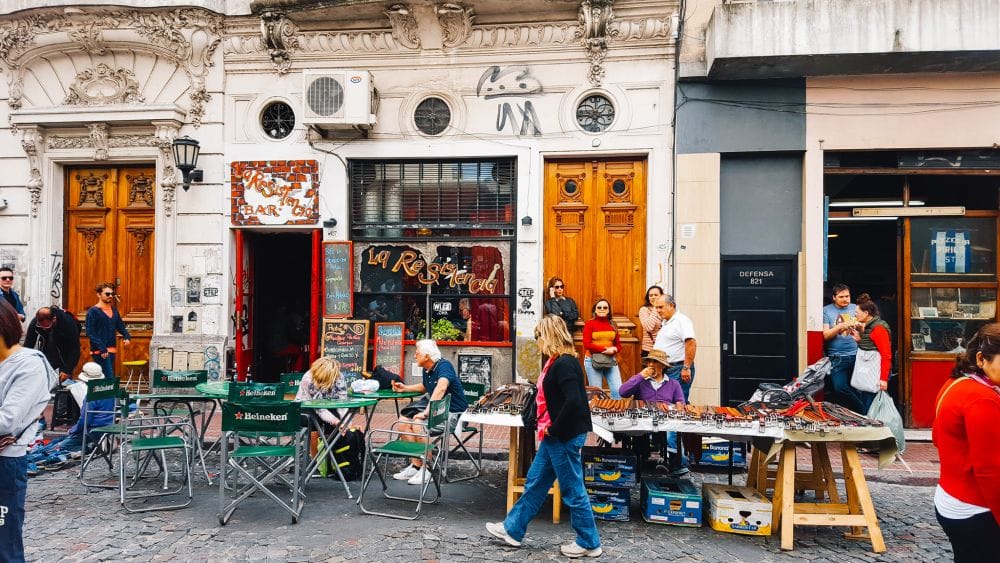
Street market scene San Telmo.
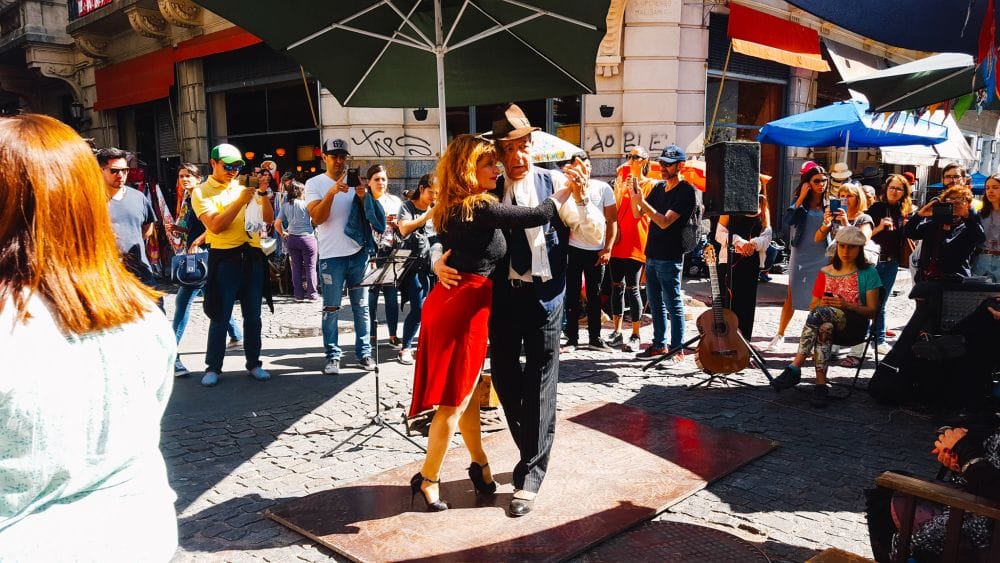
Every Sunday there is a street market in one of the most beautiful districts of Buenos Aires: San Telmo. It was once the home of the rich upper class. In 1871, after a yellow fever epidemic, they moved to the northern parts of the city. After its economic decline, the quarter has increasingly attracted artists and intellectuals in recent decades and developed into a tourist attraction.
Walking through the pedestrian zone Calle Florida, you will meet numerous money changers who offer to exchange Euro and US Dollar for Argentine Pesos. Already from a distance, you can hear them shouting “cambio, cambio”.
Argentina qualifies for the 2018 FIFA World Cup in Russia on the final matchday thanks to three goals scored by Lionel Messi. The event is seen as a proof of God and will be celebrated with a horn concert in the Plaza de la República.
Daniel Krull of the German Embassy observes that most people who make decisions in the agricultural sector today no longer live in the countryside themselves, but in the city. This has an impact on the methods used in industrial agriculture and leads to an overuse of agricultural land.
According to Daniel Krull, companies are trying to solve internal problems with their CSR activities and are generally not involved for humanistic reasons.
Tonight I gave a lecture at the Universidad del CEMA, where I presented the first results of my research trip. The internationally composed group of students discussed the findings in a lively way and relates them to their respective home countries.
The founding rector of the Universidad de San Andrés, Francisco von Wuthenau, points out that apart from the agricultural sector in Argentina, there are only a few entrepreneurs who own a significant share of their company. Rather, there are employed managers. This has an impact on the way companies are run.
Francisco von Wuthenau states that in Argentina, the idea prevails that the country is rich without having to work for that wealth. This leads to Argentina permanently living beyond its means.
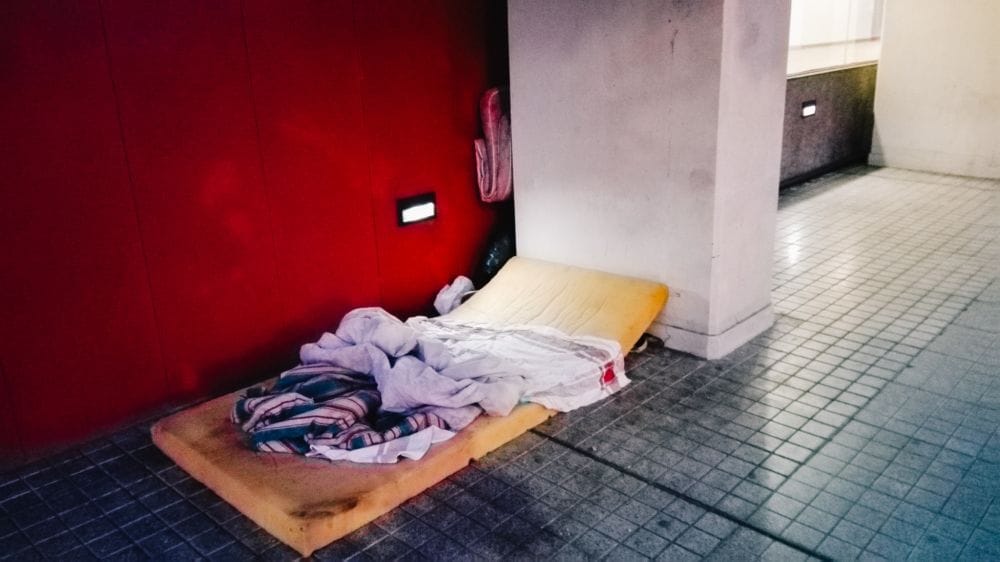
In the centre of Buenos Aires, there are a striking number of people living on the streets. Some of them have really settled in - with chairs, small tables, mattresses and plastic curtains for their privacy.
The streets of downtown Buenos Aires often smell of urine as an expression of poverty.
Opposite a McDonald’s branch in Plaza de la República, a young mother begs with two small children in the evening. When she enter the McDonald’s with the little girl around 11:30 p.m., she leaves the second one, who isfive years old at most, sleeping alone on the corner. People pass by without paying any attention to her.
On the Avenida 9 de Julio, one of the main traffic arteries of Buenos Aires, the Metrobus travels on the left while the individual travels on the right. This leads again and again to dangerous situations with pedestrians, because they do not expect the bus from the “wrong” side.
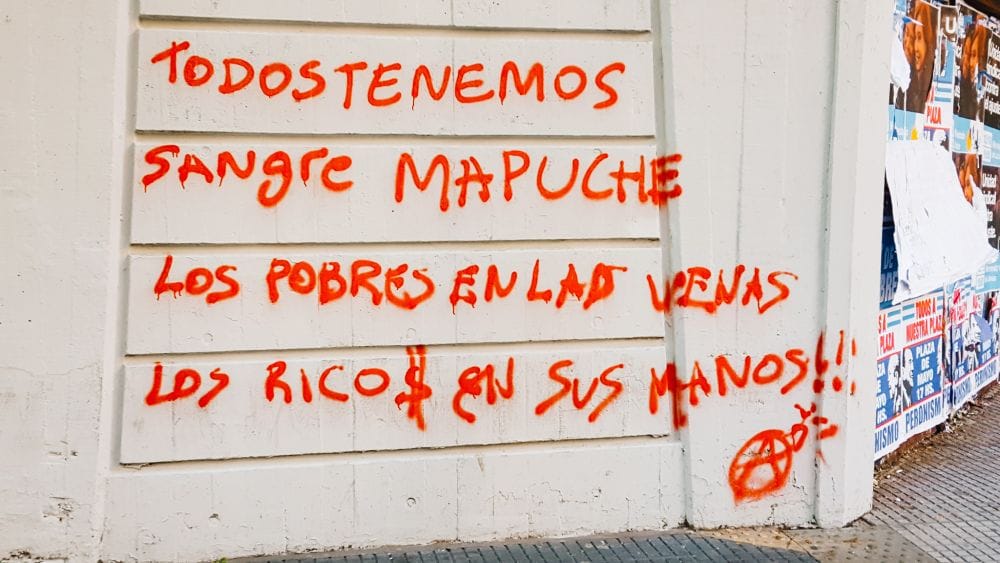
In Buenos Aires, one repeatedly comes across politically motivated graffiti: “We all have Mapuche blood: the poor in our veins, the rich on our hands”.
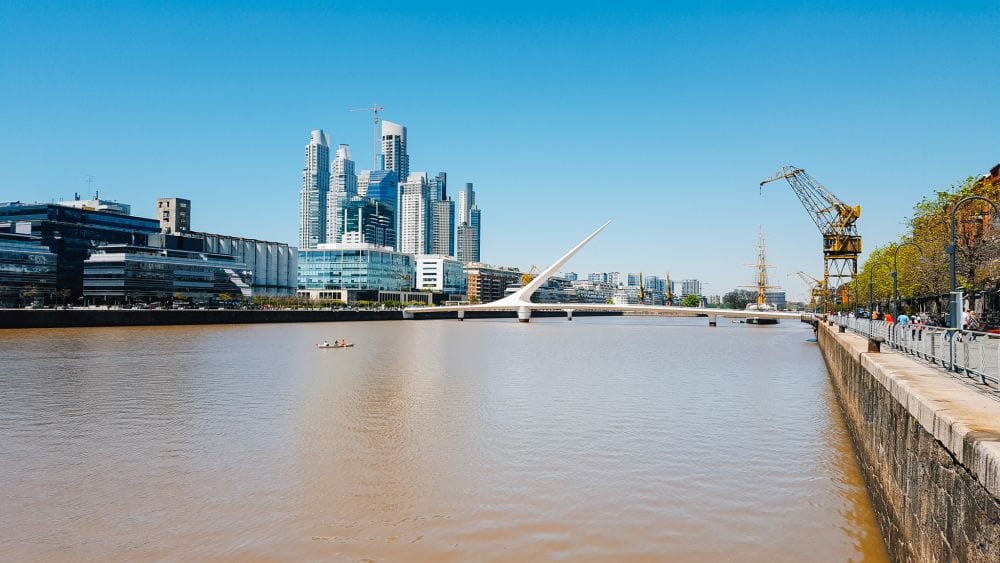
On the way back from the modern harbour district Puerto Madero to the accommodation at the obelisk, I become victim of the tourist trap “bird droppings attack”. From behind, I was sprayed with bird droppings. A “nice” woman is there “by chance” and offers me a wrinkled handkerchief. I reject this thankfully and go on briskly. Thanks to this reaction no harm was caused.
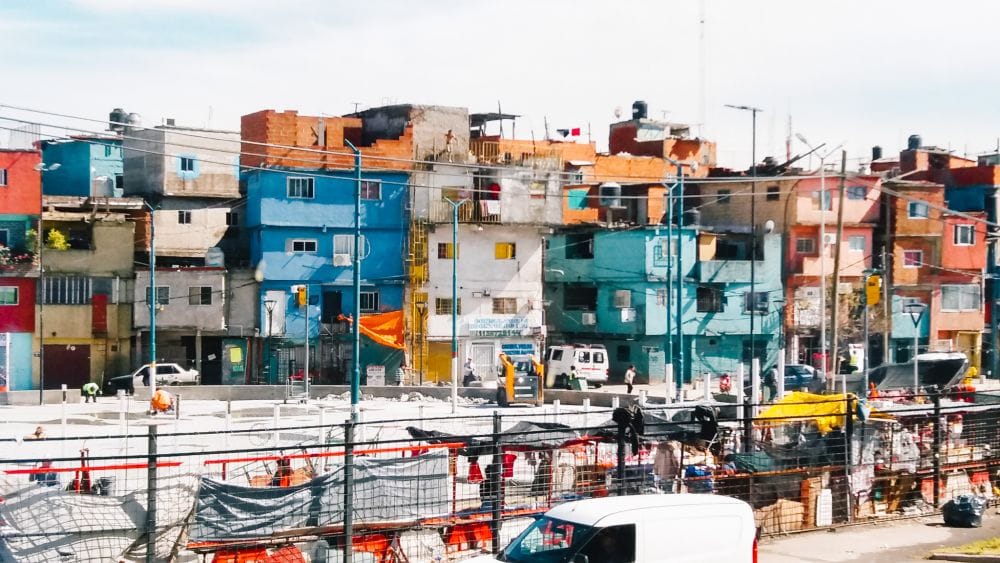
The “other” Buenos Aires manifests itself directly behind the station Retiro. There you will find the informal settlement Villa 31, the largest slum area of the city. In multi-storey, wildly adjacent and superimposed buildings, made of various materials, mainly people from other Latin American countries such as Paraguay, Bolivia or Peru have settled down.
During the evening walk we meet tango dancers before the National Congress. They dance out of solidarity with the indigenous people of Argentina. The strengthening of the mining sector and agriculture in previously peripheral areas increases the danger of land conflicts with indigenous population groups; an issue that has hardly played a role in Argentina so far.
Visitors from Germany are taking a city tour with the open double-deckers of Buenos Aires Bus today. Unfortunately there are no headphones for the audio guide tour. Due to the extended weekend, the responsible company did not deliver any headphones.
In the noble district of Belgrano, you can see many dog sitters picking up up to 20 dogs in their homes, walking them through the streets to the park and then handing them back to their owners or their servants.
Grupo Murchison operates its own treatment plant for its port, as the city does not provide this infrastructure. Rather, the municipality itself discharges a large part of its wastewater into the sea without treatment.
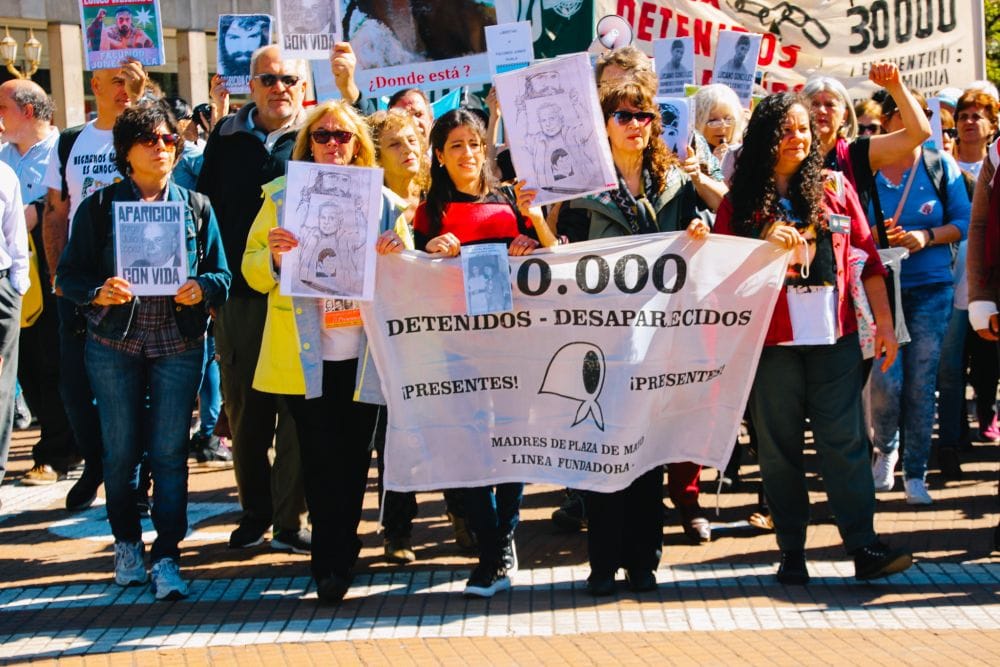
Since 41 years every Thursday the Madres of the Plaza de Mayo march peacefully in front of the government palace Casa Rosada. They demand that the fate of their children and grandchildren who disappeared under the military dictatorship be finally clarified.
Today other political groups are demonstrating in the Plaza de Mayo. On Sunday there are parliamentary elections in Argentina. Former President Cristina Kirchner is running for Senate. She is given good chances, although corruption proceedings are underway against her.
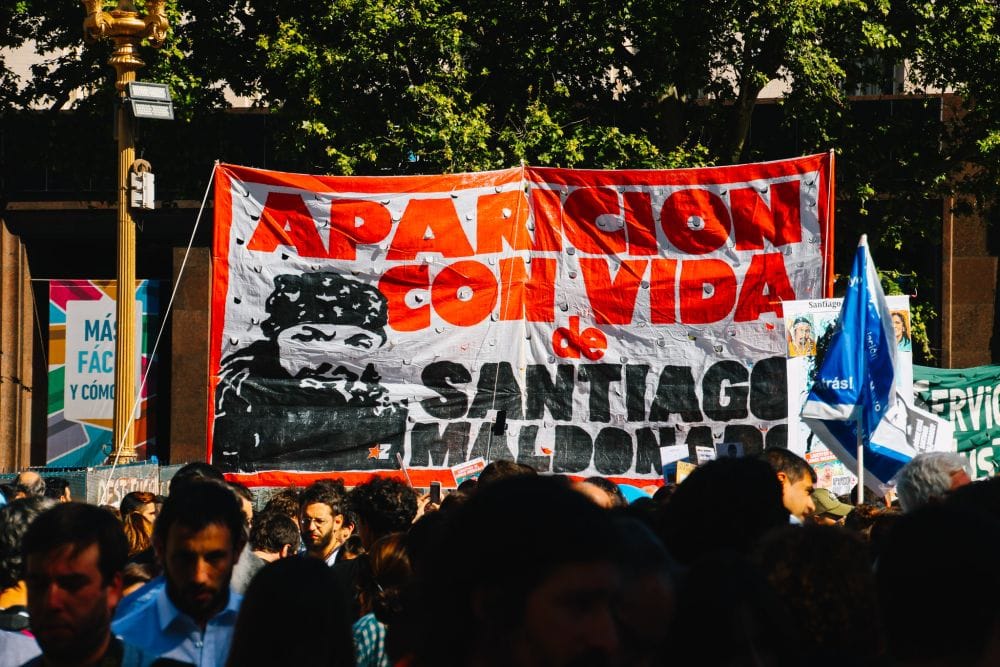
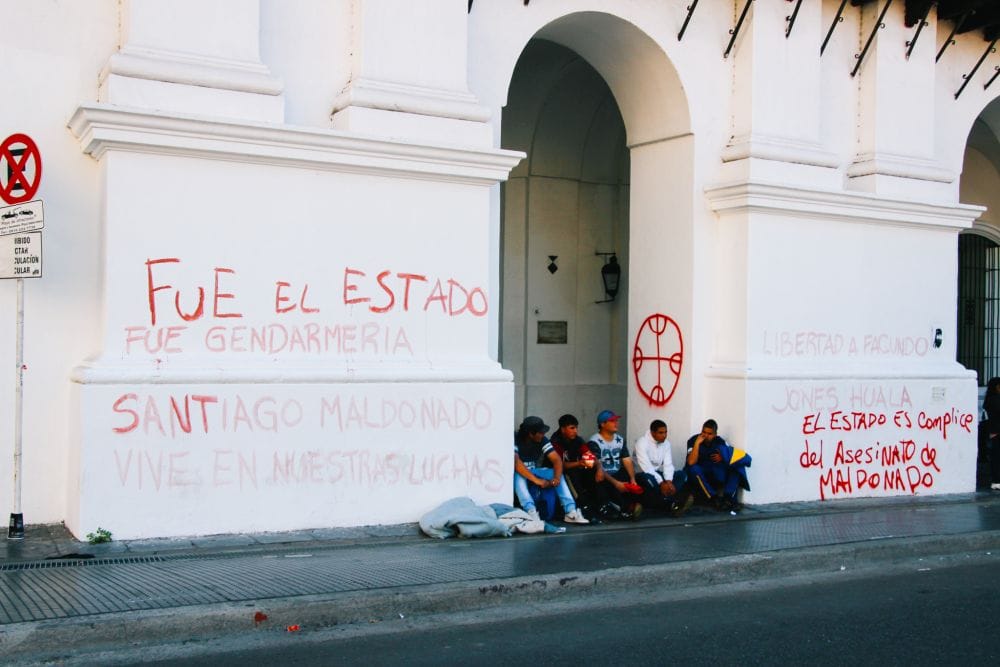
Two months ago, a young student named Santiago Maldonado disappeared after attending a rally in the south of the country in solidarity with the Mapuche indigenous people. State institutions are accused of having something to do with the disappearance of Santiago Maldonado. Government and opposition blame each other of being responsible for the case.
The documentary “El mensajero del caballo blanco” tells the story of Robert J. Cox. During the military dictatorship, he was editor-in-chief of the English-language Argentine daily newspaper “Buenos Aires Herald”. This newspaper reported more openly about the numerous disappeared (Desaparecidos) and the concerns of the Madres de Plaza de Mayo, who still demonstrate today for the clarification of the deeds and the punishment of the perpetrators.
“Cristina and Lula are relatives, or at least they went to the same school,” says a taxi driver with a joking undertone, alluding to the corruption trials currently underway against the two former presidents of Argentina and Brazil.
The Archbishop of Buenos Aires, Cardinal Mario Aurelio Poli, holds a children’s and youth service in the “Luna Park” indoor stadium, which is packed with around 10,000 people.
As predicted, the governing coalition of Argentine President Mauricio Macri won today’s parliamentary elections. Former President Cristina Kirchner suffers a clear defeat, but nevertheless moves into the upper house of the Argentine National Congress as a senator.
There are high fees for withdrawing cash with foreign credit cards from ATMs. FinTech applications such as Azimo offer a cost-effective alternative for cash withdrawals.
Today I am taking part in the ECOSUIZA 2017 event. This will take place under the motto “Sustainable Management - Sustainable Investments: Las Inversiones en la era de los Objetivos de Desarrollo Sostenible”. Approaches for sustainable investments will be presented and discussed. The discussion will continue with lunch at the Swiss Ambassador’s residence.
As early as 1776, Adam Smith gave an indication in his work Wealth of Nations of how companies can be persuaded to commit themselves to achieving the goals of sustainable development: “We address ourselves, not to their humanity but to their self-love, and never talk to them of our own necessities but of their advantages.”
Art and culture are very important in Argentina - there are many free concerts and museums that do not require admission. Therefore, the audience is much more mixed than in Central Europe. The Centro Cultural Kirchner (CCK) offers twelve-tone music free of charge tonight.
While all of the private sector’s interlocutors were very reliable, another academic interlocutor did not appear at the agreed time today.
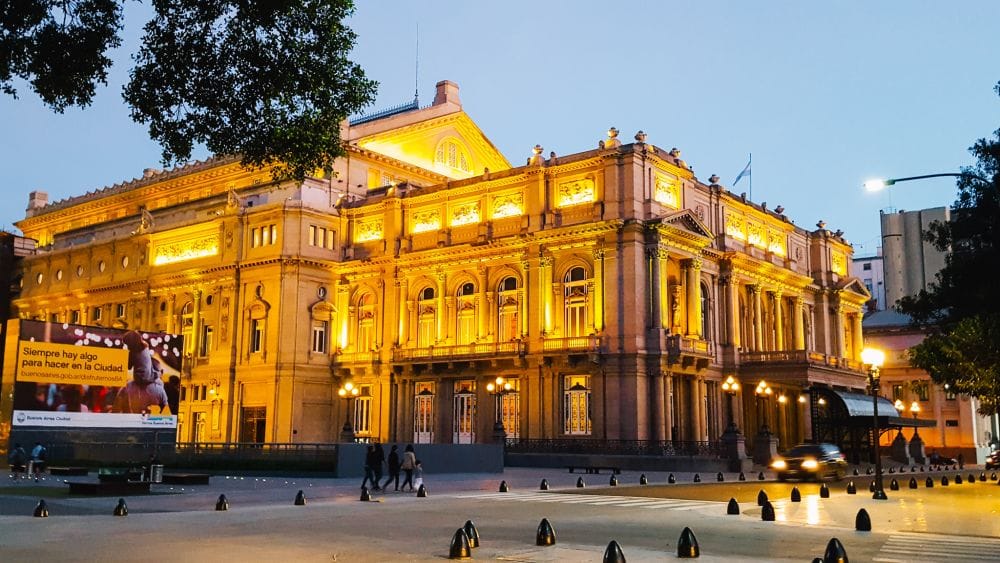
Today we visit a final rehearsal of the Buenos Aires Philharmonic Orchestra at the renowned Teatro Colón. The play “Ein Heldenleben, Op. 40” by Richard Straus.
During my research stay, I spoke with numerous company representatives who wanted to be part of the solution. This stands in contrast to the actual behaviour of many companies, which you read about in the newspaper or which you perceive yourself. Here the companies seem to be part of the problem. How can this discrepancy be explained?
The Turkish sociologist Zeynep Tufekci addresses this phenomenon in her TED talk, which I am going to watch today: “I read the many well-intended statements that these people [owners of big internet companies] put out. But, it is not the intent or the statements that matter, it is the structures and business models they are building. And that is the core of the problem.”
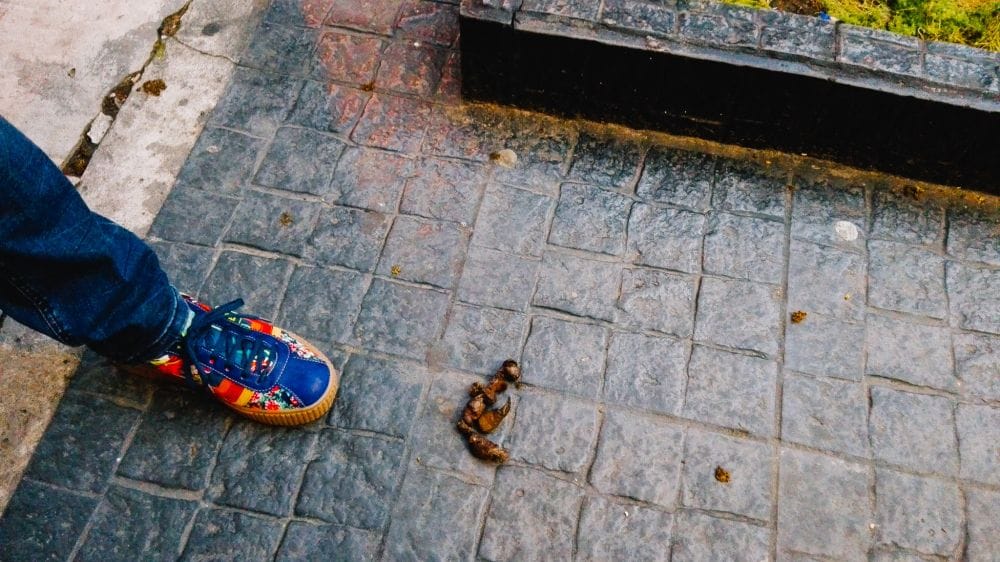
Compared to the other Latin American cities we have visited in the past months, the pavements in Buenos Aires are remarkably heavily soiled with dog excrement.
The Peruvian municipality of Buenos Aires today hosts the traditional procession “del Señor de los Milagros”. The procession begins in the Basílica de La Piedad and continues along the Avenida de Mayo.
Today, the first contact person from the private sector forgot our appointment. However, he has no other obligation, so that we could still conduct our conversation as planned.
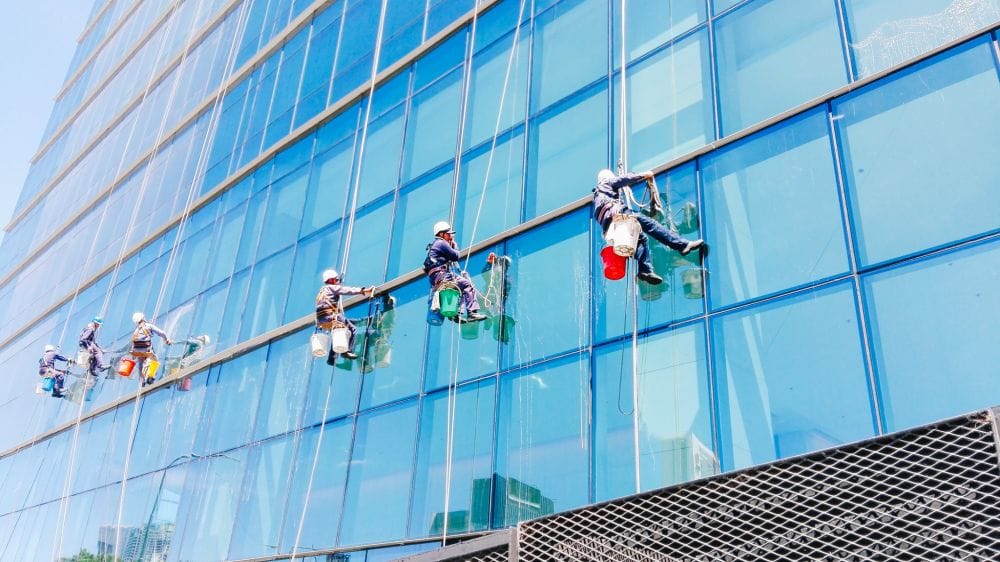
Would the Swiss accident insurance Suva approve of the safety standards under which the windows of Latin American skyscrapers are cleaned?
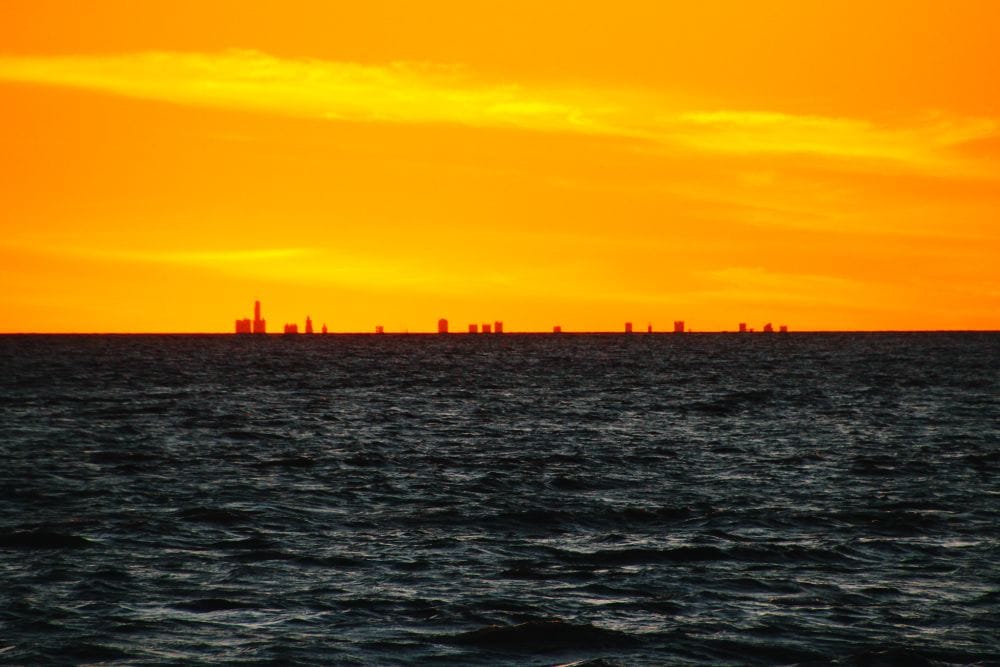
View over the Río de la Plata to the skyline of Buenos Aires
A little more than 50km away from Buenos Aires, on the other side of the Río de la Plata, lies the Uruguayan colonial town Colonia del Sacramento. With the fast ferry, the crossing takes about one hour. In the evening there is a spectacular view over the river to the skyline of Buenos Aires.
Pablo Manrique of Nestlé Argentina points out that due to subsidies, electricity and water are so cheap in Argentina that investments to conserve resources are unlikely to pay for themselves. Due to the lack of ROI, it is difficult to justify such investments. Nevertheless, the Swiss company is investing in environmental protection measures.
The documentary “El futuro llegó” deals with the social and ecological consequences of the petrochemical industrial park in the port city of Ingeniero White, 650 km south-west of Buenos Aires. The construction of the industrial park was associated with a strong hope for progress. Today, however, many residents feel that they are not benefiting from the economic activity, but on the contrary are negatively affected. Massive environmental pollution and fatal accidents at work occur time and again.
This morning I gave the last lecture within the scope of the research trip. It was organized by the Compliance Working Group of the AHK Argentina and took place on the campus of the IAE Business School - Universidad Austral. The campus is about 50km away from the city centre. Many thanks to Barbara Konner and Matthias Kleinhempel and their teams!
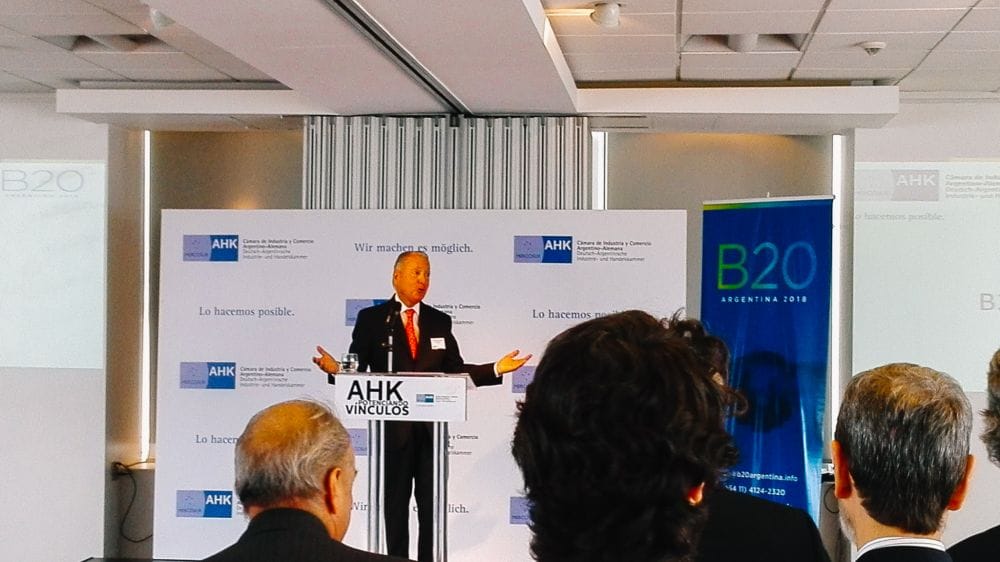
Daniel Funes de Rioja takes over the presidency of the B20
Today, Argentina is taking over the chair from Germany in the G20 group of the twenty most important industrialised and emerging countries. On this occasion, a networking lunch of the Dialogue Forum B20 with business representatives from both countries will take place at the AHK Argentina. In his brief address, Jürgen Heraeus, the current President of the B20, emphasizes the central importance of corporate responsibility.
The last interview of the research trip I conducted with Reynaldo Postacchini from the agricultural machinery manufacturer Claas. He spends most of his time with his customers in the Argentine hinterland and points out the significant differences between living and working in the city and in the country.
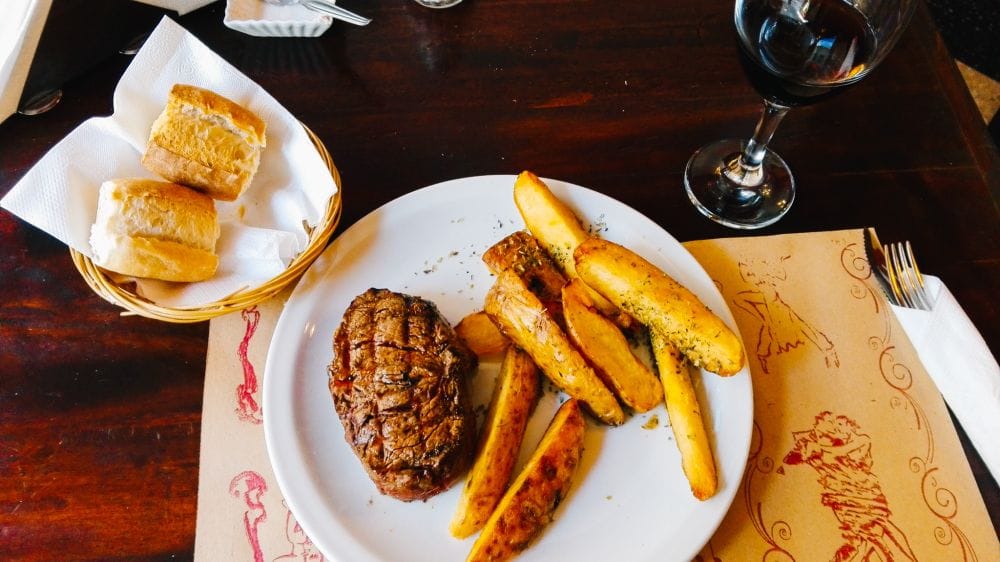
At the end of your stay in Argentina, a tender sirloin steak in the Santos Manjares restaurant is a must :-)
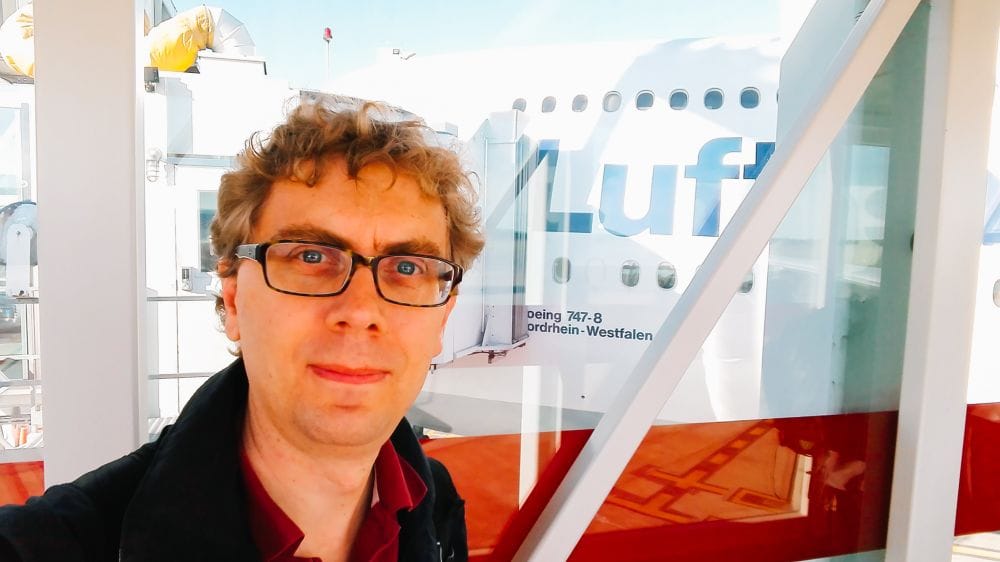
After 28 days in Argentina it’s time to say goodbye. At 18:05 local time, flight LH511 leaves Buenos Aires for Frankfurt am Main. A good 13 hours flight time lie ahead of us.
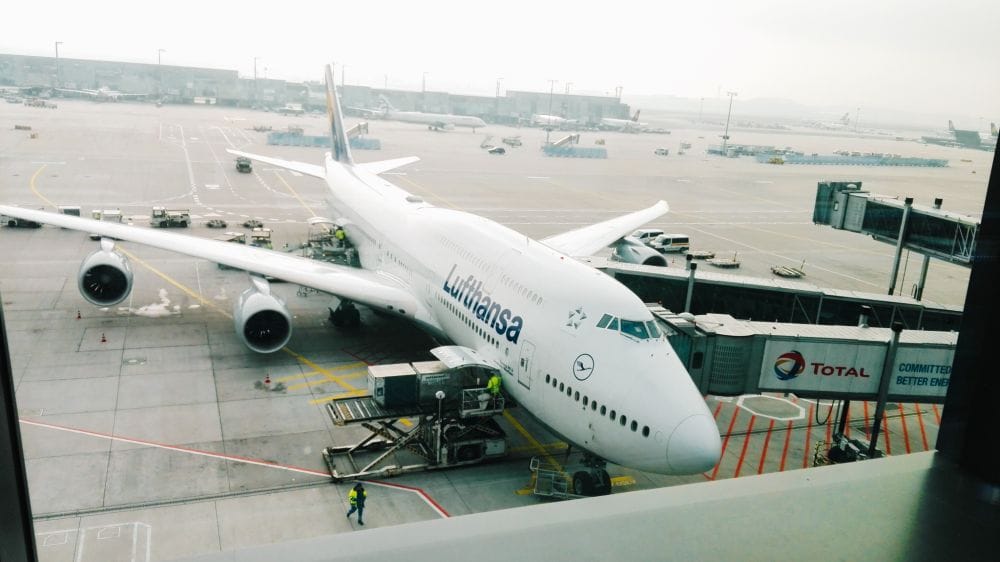
After a total of 124 days in Latin America, my research trip is drawing to a close. After landing in Frankfurt am Main, I take the train to Switzerland. This is now possible again without any problems. During my absence the Rhine valley route was interrupted from the 12th August to the 2nd October, after the tracks had lowered due to tunnel work at Rastatt.
My heartfelt thanks go to the 128 interview partners who gave me exciting insights into responsible management in Latin America, the bilateral chambers of commerce, universities and the Konrad Adenauer Foundation, which organized the platforms for my 13 lectures, and the HTW Chur, which made the research project possible.